#i just read the war of the worlds by h.g wells
Explore tagged Tumblr posts
Text
I hate it when I finish a sad book and then can't stop crying for a few hours. like what am I supposed to do next when all I have left is a feeling of emptiness lmao
#i just read the war of the worlds by h.g wells#and ohhhh boyyyy#i could write a whole essay on this#i loved it sm#and the ending? jesus fucking christ#I HAD CHILLS#LITERAL CHILLS#it's been a while since a book made me cry sm#rambles#bookblr
13 notes
·
View notes
Text

RPF Services Edition Fic Rec: Maybe I'm a fool, but it's fun by @babe-heffron (modwyrs on AO3)
Fandom: Band of Brothers Relationship: LuzToye George Luz/Joe Toye Recommended if you: Enjoying bouncing off your walls, screaming and chewing on your arm because they are skin to goddamn skin and somehow it's still burning so SLOW and so GOOD post-war. (More thoughts under the cut!)
Art featured is a mock up I based off of Armed Services Editions. This one in particular uses elements from the original book cover for War of the World by H.G. Wells, fonts from the time period, and detail from John Singer Sargent's 'An Artist in His Studio' (1904).
Domestic and brimming with so much sexual tension. Post-War fics my beloved. George lights up the room and chews on his insecurities between half-jokes. Joe runs hot most days but is so soft around the edges. Second shower back stateside made me shriek. So tender—any time I think about it I feel my heart quite literally being tugged down.
Loved Caoimhe's exploration of the paratroopers vs. the rest of the army even in post-war. The whole "big and aggressive" description of irl Web for Dick permeates for so many in the airborne and it grounded this fic in the time period so well. Can't stop thinking about that detail.
Been a while since a fic kept me up 'til the wee hours of the morning and god I loved this so, so much. I've dabbled in some LuzToye here and there so 80k words of it was such a GIFT. Easily became one of my favorites. Re-reading it feels just as rewarding as the first time.
#band of brothers#fic rec#evidenceofrecs#luztoye#babe-heffron#rpf service edition#joe toye#george luz#ao3#been wanting to do recs that do the works justice! hopefully this does <3#LOVE love love this fic caiomhe!!
42 notes
·
View notes
Text
9 Fandom Peeps to Get to Know Better:
thank you to @thighzp @anti-homophobia-cheese and @fairflowered for tagging me!
3 Ships I like: firstprince (rwrb), kitty (tsc), narlie (heartstopper)
First Ship Ever: i was a sucker for disney movies as a kid, so i think it would have been mulan and li shang if i'm entirely honest LMAO
Last Song You Heard: no one mourns the wicked from the wicked musical (i am going to be SO insufferable from tomorrow onwards)
Favorite Childhood Book: got reminded by d's post that i literally owned all of the enid blyton books at one point, but i think i liked the famous five more than the secret seven
Currently Reading: trying (key word here) to finish off percy jackson and the olympians (i'm up to battle of the labyrinth), and i would like to finish howards end by e.m forster, tess of the d'urbervilles by thomas hardy, and the war of the worlds by h.g wells, because i never finished them when i was reading them for uni
Currently Watching: i'm on the last few episodes of mary and george and have been for a while, but i saw yellowjackets was added back onto australian netflix so i'm going to finish that before the new season. and i'm in a constant state of rewatching rupaul's drag race from seasons 5-9
Currently Consuming: i'm in the middle of having a cup of tea :)
Currently Craving: some motivation to write, maybe a couple of biscuits and a tattoo appointment
Tags for 9 people: i'm not quite sure who's been tagged already, but i'm going to tag @bookishjules @daisymayys @remembertheskittles @colebegins @catdadacd @ibidflash @bcyoureallthatmakessense @reginamillls and @hoezier-than-thou (no pressure!)
but honestly, if you haven't done it and would like to do it, just say tagged you :)
7 notes
·
View notes
Note
A while ago while I was in tumblr jail, you posted that you had a masters in science fiction literature (unless you didn't, I have been known to be mistaken), and I am wondering, what do you consider 'important' works of science fiction? Like the science fiction literary canon? I am so curious. Feel free to ignore, I will not harass you.
Yes! I do. I can tell you the ones that I was assigned (I'm afraid that the list skews extremely male and (especially) white).
Mary Shelley, Frankenstein (1818)
Olaf Stapledon, Last and First Men (1930) and Star Maker (1937) [You can probably add Odd John (1935) to this list]
Jules Verne, Journey to the Centre of the Earth (1864) and 20,000 Leagues Under the Sea (1870) [You can probably add From the Earth to the Moon (1865)]
H.G. Wells, The Time Machine (1895) and War of the Worlds (1897) [Though you can probably go ahead and add The Island of Doctor Moreau (1896), The Invisible Man (1897) and The First Men in the Moon (1901)]
Charlotte Perkins Gilman, Herland (1915)
Catherine Burdekin (writing as Murray Constantine), Swastika Night (1937)
Karel Čapek, R.U.R. (1920)
Isaac Asimov, I, Robot (1950) [You can probably add the first three Foundation novels here as well]
Yevgeny Zamyatin, We (1921)
George Orwell, Nineteen Eighty-Four (1949)
Arthur C. Clarke, 2001: A Space Odyssey (1967) and Rendezvous with Rama (1973) [Add: Childhood's End (1953) and The Fountains of Paradise (1979)
John Wyndham, Day of the Triffids (1951) [add: The Chrysalids (1955) and The Midwich Cuckoos (1957)]
H.P. Lovecraft, "The Call of Cthulhu" (1926) [add The Shadow over Innsmouth (1931)]
Richard Matheson, I Am Legend (1954)
Alfred Bester, The Stars My Destination (1956)
Robert Heinlein, Starship Troopers (1959) [Probably Stranger in a Strange Land (1961) and The Moon is a Harsh Mistress (1966) too, depending on, you know, how much of Heinlein's bullshit you can take]
J.G. Ballard, The Drowned World (1962) [Also, The Burning World (1964) and The Crystal World (1966)]
Phillip K. Dick, The Man in the High Castle (1962) [Also Do Androids Dream of Electric Sheep? (1968) and several of his short stories]
Frank Herbert, Dune (1965)
Michael Moorcock, Behold the Man (1969)
Kurt Vonnegut, Slaughterhouse-5 (1969)
Ursula Le Guin, The Dispossessed (1974) [Also The Lathe of Heaven (1971) and The Left Hand of Darkness (1969)]
Brian Aldiss, Supertoys series
William Gibson, Neuromancer (1984)
Kim Stanley Robinson, Red Mars (1992) [Also Green Mars and Blue Mars]
They also included Iain M. Banks's The Algebraist (2004), but I personally think you'd be better off reading some of his Culture novels
Other ones that I might add (not necessarily my favourite, just what I would consider the most influential):
Joe Haldeman, The Forever War (1974)
Matsamune Shiro, Ghost in the Shell (1989-91)
Katsuhiro Otomo, Akira (1982-1990)
Octavia Butler, Lilith's Brood (1987-89) and Parable of the Sower (1993)
Poul Anderson, Operation Chaos (1971)
Hector Garman Oesterheld & Francisco Solano Lopez, The Eternaut (1957-59)
Liu Cixin, The Three-Body Problem (2008)
Robert Shea and Robert Anton Wilson, The Illuminatus! Trilogy (1975)
William Hope Hodgson, The House on the Borderland (1908)
Neal Stephenson, Snow Crash (1992)
Joanna Russ, The Female Man (1975)
Orson Scott Card, Ender's Game (1985) [Please take this one from a library]
Edgar Rice Burroughs, A Princess of Mars (1912)
Margaret Atwood, The Handmaid's Tale (1985) and Oryx and Crake (2003)
Aldous Huxley, Brave New World (1932)
Osamu Tezuka, Astro Boy (1952-68)
Ray Bradbury, Fahrenheit 451 (1953)
Madeleine L'Engle, A Wrinkle in Time (1962)
Walter M. Miller, A Canticle for Leibowitz (1959)
Douglas Adams, Hitchhiker's Guide to the Galaxy (1979)
126 notes
·
View notes
Note
4, 8, 9, 12
4 - underrated mission(s)
Maybe the Rakia mission the the ISS which happened back in 2022 but I only found out about earlier this year. Admittedly not too much novel about it, but there was Hebrew language on the ISS.
8 - fave space book
For nonfiction, I'll have to go with Cosmos by Carl Sagan, outdated as it is, because it left a big impression on me when I was 12 and I think it's at least part of the reason I got degrees in physics.
For fiction, I'm going with the Martian by Andy Weir because I just loved it and when asked I often list it as my favorite book even though I could never pick just one favorite book.
(Some runner-ups for favorite fiction space book are Artemis by Andy Weir, The Lady Astronaut books by Mary Robinette Kowal, and War of the Worlds by H.G. Wells.)
9 - fave space movie
I'm thinking The Martian. One of the few book-to-movie adaptations that satisfied me.
(I also really liked Star Trek IV: The Voyage Home, but that mostly takes place on Earth and doesn't really feel like a "space movie".
12 - what got you into space?
You want the long story? I guess I've always been drawn to knowing things no one else knows, and space is pretty unknown. When I was 5 I had a special interest in space (there was a time in my childhood when every year of my life could be defined by whatever my special interest at the time was) that went away after some time like my special interests at the time did.
But then when I was 12 we had a semester of Astronomy for our science class, which I was very excited about and it caused me to return to my old special interest in space. During that semester (I'm totally dating myself here!) Cosmos: A Spacetime Odyssey with Neil DeGrasse Tyson aired and I loved it so much that I insisted on reading the book by Carl Sagan and (a little later) watching Cosmos: A Personal Voyage with Carl Sagan, and I've been interested in space ever since.
#questions answered#kaiyves-backup#iss#international space station#rakia#isa#eytan stibbe#astronaut#cosmos#carl sagan#physics#sci fi#the martian#andy weir#artemis#lady astronaut books#war of the worlds#reading#star trek#neil degrasse tyson#Astronomy#astronomía#мкс#международная космическая станция#actually autistic
7 notes
·
View notes
Text
ChatGPT and the movie ‘Her’ are just the latest example of the ‘sci-fi feedback loop’
by Rizwan Virk, Faculty Associate and PhD Candidate in Human and Social Dimensions of Science and Technology at Arizona State University

In May 2024, OpenAI CEO Sam Altman sparked a firestorm by referencing the 2013 movie “Her” to highlight the novelty of the latest iteration of ChatGPT.
Within days, actor Scarlett Johansson, who played the voice of Samantha, the AI girlfriend of the protagonist in the movie “Her,” accused the company of improperly using her voice after she had spurned their offer to make her the voice of ChatGPT’s new virtual assistant. Johansson ended up suing OpenAI and has been invited to testify before Congress.

This tiff highlights a broader interchange between Hollywood and Silicon Valley that’s called the “sci-fi feedback loop.” The subject of my doctoral research, the sci-fi feedback loop explores how science fiction and technological innovation feed off each other. This dynamic is bidirectional and can sometimes play out over many decades, resulting in an ongoing loop.
Fiction sparks dreams of Moon travel
One of the most famous examples of this loop is Moon travel.
Jules Verne’s 1865 novel “From the Earth to the Moon” and the fiction of H.G. Wells inspired one of the first films to visualize such a journey, 1902’s “A Trip to the Moon.”
The fiction of Verne and Wells also influenced future rocket scientists such as Robert Goddard, Hermann Oberth and Oberth’s better-known protégé, Wernher von Braun. The innovations of these men – including the V-2 rocket built by von Braun during World War II – inspired works of science fiction, such as the 1950 film “Destination Moon,” which included a rocket that looked just like the V-2.
Films like “Destination Moon” would then go on to bolster public support for lavish government spending on the space program.
youtube
Creative symbiosis
The sci-fi feedback loop generally follows the same cycle.
First, the technological climate of a given era will shape that period’s science fiction. For example, the personal computing revolution of the 1970s and 1980s directly inspired the works of cyberpunk writers Neal Stephenson and William Gibson.
Then the sci-fi that emerges will go on to inspire real-world technological innovation. In his 1992 classic “Snow Crash,” Stephenson coined the term “metaverse” to describe a 3-D, video game-like world accessed through virtual reality goggles.
Silicon Valley entrepreneurs and innovators have been trying to build a version of this metaverse ever since. The virtual world of the video game Second Life, released in 2003, took a stab at this: Players lived in virtual homes, went to virtual dance clubs and virtual concerts with virtual girlfriends and boyfriends, and were even paid virtual dollars for showing up at virtual jobs.
This technology seeded yet more fiction; in my research, I discovered that sci-fi novelist Ernest Cline had spent a lot of time playing Second Life, and it inspired the metaverse of his bestselling novel “Ready Player One.”
The cycle continued: Employees of Oculus VR – now known as Meta Reality Labs – were given copies of “Ready Player One” to read as they developed the company’s virtual reality headsets. When Facebook changed its name to Meta in 2021, it did so in the hopes of being at the forefront of building the metaverse, though the company’s grand ambitions have tempered somewhat.
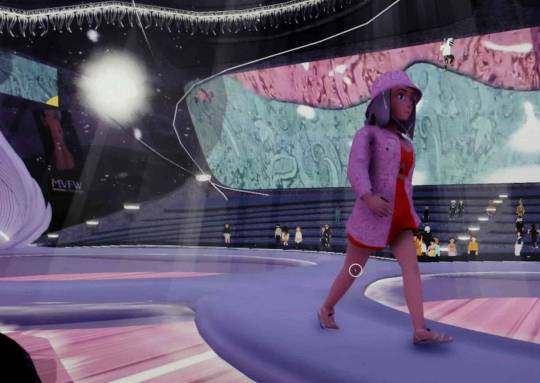
Another sci-fi franchise that has its fingerprints all over this loop is “Star Trek,” which first aired in 1966, right in the middle of the space race.
Steve Perlman, the inventor of Apple’s QuickTime media format and player, said he was inspired by an episode of “Star Trek: The Next Generation,” in which Lt. Commander Data, an android, sifts through multiple streams of audio and video files. And Rob Haitani, the designer of the Palm Pilot’s operating system, has said that the bridge on the Enterprise influenced its interface.
In my research, I also discovered that the show’s Holodeck – a room that could simulate any environment – influenced both the name and the development of Microsoft’s HoloLens augmented reality glasses.
From ALICE to ‘Her’
Which brings us back to OpenAI and “Her.”
In the movie, the protagonist, Theodore, played by Joaquin Phoenix, acquires an AI assistant, “Samantha,” voiced by Johansson. He begins to develop feelings for Samantha – so much so that he starts to consider her his girlfriend.
ChatGPT-4o, the latest version of the generative AI software, seems to be able to cultivate a similar relationship between user and machine. Not only can ChatGPT-4o speak to you and “understand” you, but it can also do so sympathetically, as a romantic partner would.
There’s little doubt that the depiction of AI in “Her” influenced OpenAI’s developers. In addition to Altman’s tweet, the company’s promotional videos for ChatGPT-4o feature a chatbot speaking with a job candidate before his interview, propping him up and encouraging him – as, well, an AI girlfriend would. The AI featured in the clips, Ars Technica observed, was “disarmingly lifelike,” and willing “to laugh at your jokes and your dumb hat.”
But you might be surprised to learn that a previous generation of chatbots inspired Spike Jonze, the director and screenwriter of “Her,” to write the screenplay in the first place. Nearly a decade before the film’s release, Jonze had interacted with a version of the ALICE chatbot, which was one of the first chatbots to have a defined personality – in ALICE’s case, that of a young woman.

The ALICE chatbot won the Loebner Prize three times, which was awarded annually until 2019 to the AI software that came closest to passing the Turing Test, long seen as a threshold for determining whether artificial intelligence has become indistinguishable from human intelligence.
The sci-fi feedback loop has no expiration date. AI’s ability to form relationships with humans is a theme that continues to be explored in fiction and real life.
A few years after “Her,” “Blade Runner 2049” featured a virtual girlfriend, Joi, with a holographic body. Well before the latest drama with OpenAI, companies had started developing and pitching virtual girlfriends, a process that will no doubt continue. As science fiction writer and social media critic Cory Doctorow wrote in 2017, “Science fiction does something better than predict the future: It influences it.”
#science fiction#sci fi movies#artificial intelligence#metaverse#isaac asimov#arthur c clarke#hg wells#open ai#technology#technopolitics#blade runner#blade runner 2049#Youtube
8 notes
·
View notes
Note
1-4 & 10-12 for The Unlikely Escape of Uriah Heep, 9-15 for FMA, 1 & 16-18 for Anne of Green Gables, 8-12 for Half-Magic, and 1, 3, 19, and 20 for The Little Riders, please?
The Unlikely Escape of Uriah Heep by H.G. Parry
what got you into this story?
My dear friend @rainintheevening recommended it to me, and I'm so glad she did! I wasn't even 20 pages in before I looked up from the page and went, "Ohoho, this book was definitely written for me!"
2. describe it in one or two sentences.
Charley Sutherland has always had the ability to read characters out of books and into real life. But when Uriah Heep, the villain from David Copperfield, begins to cause trouble, his older brother (who is perfectly ordinary in every way) will have to go to great lengths to help him out of his predicament.
3. quickly list 3 things you like about the story!
IT'S ABOUT BROTHERS
IT'S A BOOK ABOUT BOOKS
It started to look like the ending was going to be tragic, BUT IT WASN'T I CRYYYYYYYYYY T^T
4. assign this story a hyper-specific genre name, e.g. "inspirational religious semi-horror sci-fi western" (yes, that's Trigun)
Speculative literary brother fiction crossover thriller
10. if you made an amv about this, what song would you set it to?
"Brother" by Kodaline
I mean, would you look at these lyrics?
Oh brother, we'll go deeper than the ink Beneath the skin of our tattoos Though we don't share the same blood You're my brother and I love you that's the truth
;aldksj;sdkfl;sdkfldslkfj TT___TT
11. if you were put in the main character's position, how well would that go for you on a scale of 1-5?
Umm...maybe like a 4? Rob is a very normal kind of guy, and while I'm not a lawyer like him, most of the things he does are fairly ordinary, all things considered. (Well, it's not an ordinary situation at all, but I mean he doesn't have hidden magic or anything.) There's nothing particularly special about him except the lengths he's willing to go to for his brother. And I'd like to think I would do the same for my siblings if need be.
12. assuming your loved ones would be there, would you want to live in the world of the story?
YES. A world where I could potentially meet my favorite characters from beloved stories? Yeah, okay, some of the more unsavory characters show up too, but...like...I could have tea with Dumbledore. I could share crunchings and munchings with Gurgi. I could hang out with Pippi Longstocking! Maybe I could even give Kaladin Stormblessed a hug :')
Full Metal Alchemist by Hiromu Arakawa
9. give the most UNHELPFUL and/or SILLY summary possible.
A fake human uses a double amputee, a tin can, a war criminal, a butcher, and some old guy to try to become God. He fails because he didn't brush up on meteorology enough.
10. if you made an amv about this, what song would you set it to?
Funny you should ask, because I've got several ideas floating around in my head that I could actually make a reality if I just sat down and took the time! The first AMV idea I ever got, years and years ago, was one set to "Memories" by Within Temptation.
11. if you were put in the main character's position, how well would that go for you on a scale of 1-5?
Lol. 1. I would die immediately. I don't have a head for numbers or science, so I would probably be horrible at alchemy. Even if I somehow got clap-alchemy from the Truth (though how I'd be able to manage human transmutation to get that far is anyone's guess), I would fail miserably to do the things Ed does, because I am very flabby and weak and cowardly. Also I don't think I would have the gumption to do half the things he does, like pushing through the pain of automail surgery. Yeah, sorry, the world is doomed if I'm put in Ed's place.
12. assuming your loved ones would be there, would you want to live in the world of the story?
As much as I adore this story, I think I'd actually say no. There's so much danger and war on every side, and I don't much fancy the thought of losing my soul to a whirling vortex (even if my soul does get put back!). I've already laid out how I wouldn't be an alchemist, so there wouldn't even be that to compensate. Maybe I'd visit after it's no longer a fascist military state, though.
13. tell me an out-of-context piece of worldbuilding or lore!
Did you know that Amestris was the wife of Artaxerxes, king of Persia?
14. how likely do you think this story is to break a reader's heart? If you're not done with the story, just guess.
I'm biased, but I think it's pretty much guaranteed. If your heart doesn't break at least a little bit at a certain little girl and her dog, I'm not sure you have one. And there are so many other parts where I cried really hard, not least at the ending of the first anime. All I wanted to do after I finished it the first time was lie in my bed, staring at the ceiling and trying to figure out how to carry on with my life ^^'
15. what time are you most likely to be found reading/watching this story? (time of year, time of day, season of life, whatever makes sense to you)
ALL DAY ALL THE TIME.
Lol, that would have been my answer in my teenage years, but admittedly my attention has strayed to other fandoms more recently. I'm still down to read/watch FMA anytime at the drop of a hat, but these days I'm most likely to dip back into it this time of year, because I always try to have something to post for FMA Day on October 3rd. (Which reminds me, I need to get cracking on that D:)
Anne of Green Gables by L.M. Montgomery
what got you into this story?
I guess you could call it peer pressure, kinda? I just kept hearing people praising it over the years, until finally I decided I should probably see what all the fuss was about, rather than just writing it off as Not For Me because I decided that back when I was eight or something. And once I did start reading, it didn't take long for Anne to win me over ^_^
16. do you think this story has broad appeal, or is it meant for a very specific audience? if it's more "niche", what kind of person would most enjoy this story?
I do think it has broad appeal, though I'd still say it's not for everybody. Clearly, Baby Novie decided it wasn't for her because there wasn't enough high adventure in it. I think most people would be able to find something relatable or at least enjoyable about it, but some people might need to wait until they're mature enough to appreciate its merits ;)
17. compare this story to your usual tastes. how does it differ from what you've already enjoyed?
I usually prefer books with more fantastical elements in them, or at least adventuring, and that was especially true when I tried to read this book as a kid. I will certainly read the occasional historical fiction about ordinary, everyday ups and downs, but even so, I'm usually more inclined to reach for something like Austen or Dickens that has a more complicated, twisty-turny plot.
18. compare this story to your usual tastes. what parts of it are exactly the kind of thing you've always loved?
I'm actually kind of surprised this was never assigned for school, because it feels a lot like the kind of book I read a lot, and probably one I would have enjoyed more than some of the other stuff we had to read. If I'd only made the connection that it takes place around the same time as the Mandie books, I probably would have really latched onto it (even though Anne isn't about mysteries), because that was my bread and butter for several years as a kid. And Anne of Green Gables would have been much less embarrassing to return to as an adult ^^' Another element that is common to many stories I love is how friendship is treasured so highly.
Half Magic by Edward Eager
8. what questions are or were you most excited to learn the answers to while experiencing the story for the first time?
Oh man, it's been so long since the first time I read this book, I can't really remember. Especially because I was never really an "active reader" as a kid. I never stopped to ask questions, I just inhaled stories, and whatever happened in it, that was how it obviously had to be ^^' And by now, I've read the book so many times I know it back to front, and there aren't really any more questions that I care about.
At a guess, though, I might have wondered where the talisman came from and where I could get one :P
9. give the most UNHELPFUL and/or SILLY summary possible.
This book teaches you about fractions :)
10. if you made an amv about this, what song would you set it to?
Uhhhh...I really don't know. Probably some kind of instrumental track, maybe piano? And it would just be a montage of the whole story, I think.
11. if you were put in the main character's position, how well would that go for you on a scale of 1-5?
I'd say a 4 or a 5. I'd like to think I'd do pretty well at remembering not to say "I wish" out loud as much as they do, but that's never how these things go. But most of the times I say that, it's usually just things like "I wish I could remember..." or "I wish I knew why..." And I don't see how the consequences of that kind of accidental wish could be too dire XD
12. assuming your loved ones would be there, would you want to live in the world of the story?
A THOUSAND TIMES YES. How many times did I daydream about what my siblings and I would do if we got a wish-granting adventure like in the books? It might be a little annoying to have to put up with 1920s America or whenever it's supposed to be, but...wish-granting talisman. Come on.
The Little Riders by Margaretha Shemin
what got you into this story?
This was assigned for school. I don't remember when exactly that was, but I think it was a read-aloud rather than one I read to myself, so maybe first or second grade? And I just remember it being one of the books that stood out to me amongst all the others.
3. quickly list 3 things you like about the story!
It offers a unique perspective on WWII, humanizing the Nazi soldiers when most of the time, we're all content to just think of them as nothing but monsters.
It's tense and exciting - will the soldier find the little riders?!
Illustrated by Peter Spier, a staple of my childhood picture books!
19. pitch an idea for a sequel or spinoff novel for this story!
What about a parallel story about the soldier's family? What was their experience like during the war?
20. what's the WORST thing about this story, in your opinion? (feel free to be positive, e.g. "it's not longer", if you want!)
Okay, yes, I could definitely do with a longer version of this book. I would have liked more exploration of Johanna's experience of being an American girl growing up in Holland with her grandparents. Did she have culture shock at first? Does she feel more at home in Holland now? For the lack of exploration they do into her unique situation, I almost think it would have been better to just have her be a Dutch girl who's lived in Holland all her life. The extra details of her father being in the U.S. Navy kind of feels superfluous.
Story Ask Game
#ask and you shall receive#valiantarcher#ask games#the unlikely escape of uriah heep#hg parry#full metal alchemist#fullmetal alchemist#fma#anne of green gables#lm montgomery#half magic#edward eager#the little riders#margaretha shemin
5 notes
·
View notes
Note
What are your top 5 fav books (fiction) ever? Why love them?
Oooh this is an incredibly hard question and I'm probably going to make sound a bit pretentious about my choices, lmao
In no particular order (because that's too much pressure!)
1.) War of the Worlds by H.G. Wells
I actually remember my dad putting of Jeff Wayne's musical version of War of the Worlds during long car rides - I used to fall asleep to the sounds of an alien invasion!
And it's probably that version that I do truly love, however huge chunks of the narration are lifted straight from the book, so it counts.
It's just them seeing the cannons and the artilleryman saying "bows and arrows against the lightning." It's that fear that no matter how advanced, how prepared, there's just no defence against the Martian invaders. It's the hopeless panic during the exodus from London; that whole scene is so evocative. It's the image of the Martian Tripod above Big Ben that gives me Chills every time. It's the Thunderchild sinking and "taking humanity's last hope of survival. The earth belonged to the Martians." It's the Red Weed and the religious desperation of the preacher; the deluded daydreams of the artilleryman. It's the reporter feeling so, SO alone that he decides to run at the Martians to try and end his life.
(It's the eerie silence, the lack of the Martian's cry, the birds.)
It's the ending scene with his wife in the garden.
It's just all so very human at its core. It's so very Edwardian and timeless.
(I also love The Time Machine)
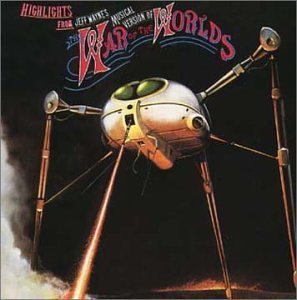
2. The Outsiders by S.E. Hinton
It's the opening line. It's that the ending line IS the opening line. The loop of that day and the inevitability of what follows.
It's Ponyboy trusting everything he knows so blindly at the beginning of the novel, and being so desperate to be part of his older brother's world. It's the inevitable, brutal coming of age.
It's a love story. But it's not. But it is. (And so many kinds of love!) Ponyboy loves Johnny. He loves Cherry. He loves Dally. He loves his brothers.
It's a little time capsule into the street culture of the 1960s and its beautiful and heartbreaking.
(I also loved Tex, too!)
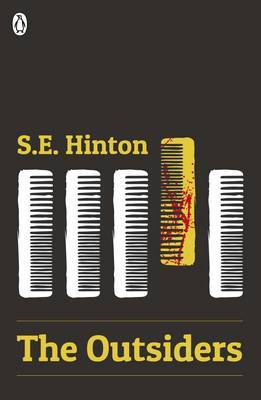
3.) The Railway Children by E. Nesbit
Similar to War of the Worlds, I think it's more that I have a personal connection with the story, as opposed to loving the book. The November before last, I played Peter in a local theatre production of The Railway Children, and it was an absolute joy. I adored getting to be an Edwardian boy for two and a half hours every night (even a cast member forgot I wasn't actually born male lmao), and the three children got so close that it does feel as though I have two sisters now lmao (And we still meet up regularly!)
It's the simplicity, I think. It's the three children finding themselves in the countryside and how very relatable what they do still is. Right down to the dialogue - I adore: "It's like we're sitting in a besieged castle, with arrows raining down on the battlements!"/"It's more like a great garden squirt."/"YOU'RE a great garden squirt." They talk and act like siblings and it's a joy.
It's the children against the backdrop of their arrested father and the horrors of the outside world that Schepanksy brings.
But I'm mostly very attached to Peter now. He's in an intriguing position of being The Boy and The Man of the House, and yet he's not the eldest, and I think that's very confusing for him. Of course, I'm projecting a little, but I think that's the core of why I'm so attached to the story - it really does capture the time and place so truly.
(Steam trains are also genuinely very exciting! If you ever get the chance to see one in action - you definitely should!)
(The Five Children and It series, though racially insensitive at times, is also very good. And I loved Jerry in the Enchanted Castle.)
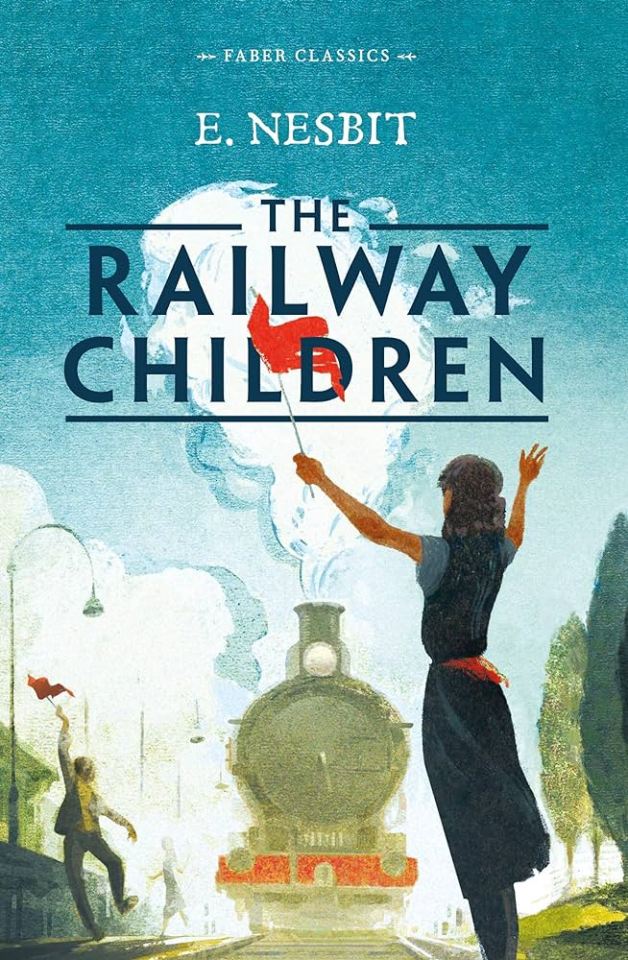
4.) My Sister Jodie by Jacqueline Wilson
Decidedly less pretentious, lol
I've read Jacqueline Wilson all through my childhood - even when I was definitely too young for some of them! My Sister Jodie, though, is the one I constantly come back to.
Jodie and Pearl get the chance to go to a boarding school because their parents work there. The boarding school is victorian, with a tower and everything. Most of the book is about the summer them and the few boarders staying the holidays - because even though Pearl thrives in the new environment, Jodie does not.
Honestly, the description of the school and the grounds and the badgers all feels like a daydream. Wilson is kind of like Nesbit in that way; she really captures what it feels like to be a child. It's simple and to be honest, until the end, not a lot really HAPPENS, but it's still enchanting.
It was the first book where I was incredibly angry at the ending because - that's not how books end! (No spoilers though!) And yet, everytime I re-read it now, I see how well foreshadowed it is.
It's really Jacqueline Wilson at her best.
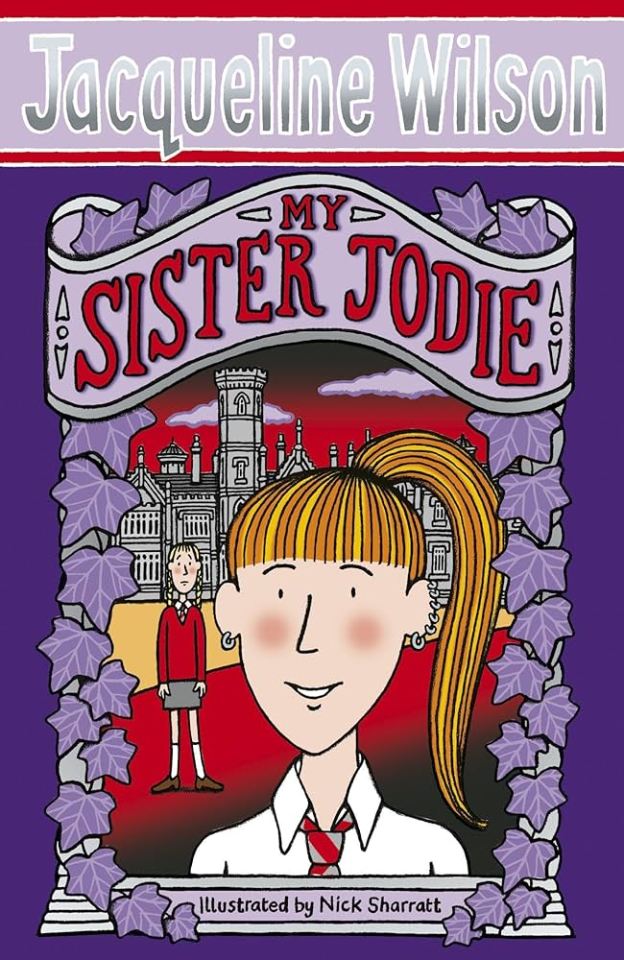
5.) The Magician's Guild by Trudi Canavan
Lord Dannyl has lived rent-free in my mind for over a decade. I find it very funny that the character I grew most attached to was the closeted gay one. (And I didn't even pick up on the subtext when I first read it at 11. It's actually a big plot line - Dannyl's suppression of his sexuality is very powerful.) I adore my little researcher wizard - I adore his librarian boyfriend. (There needs to be more Tayend/Dannyl fics on Ao3! We need to revive this ship!)
He's actually not the main character - the main character is Sonea, and even though she's not a noble, she has magic. The trilogy focuses very much on classism, and the question of what is 'good magic' and what is 'bad magic.' The magic system itself is very thought through and well done - magicians can do some cool things without being world breaking. The three different schools of magic are a fun idea. Akkarin is a really great, complex character.
I also love that we get a thieves plotline! They're all very fun and the city of Kyralia feels tangible through them.
Overall, it's a fantasy trilogy that really stuck with me and shaped a lot of my ideas going forward. (I essentially borrowed Dannyl and Tayend in the novel I wrote for my dissertation!)

I tried to stick to books that I've loved, or feel significant, but I've also recently really enjoyed:
The Gentleman's Guide to Vice and Virtue trilogy, The Last Binding Trilogy, Laura Sebastian's books, I love Christina Henry's retellings, I really loved We Have Always Lived in the Castle, and Stephen King's The Talisman.
#i have pictures of me as peter and pictures of me with a martian tripod#do you want to see#tell me you want to see them#books#turnupstalks#thanks for the ask btw#i'm working my way through the others
4 notes
·
View notes
Text
The Dispossessed design commentary, cont.
Today I wanted to talk about one of the Playbook Moves for The Dispossessed.

The whole Playbook emerges from the central metaphor that this whole playbook came from: being an immigrant in a foreign country. Now this comes with a biiiiiiig caveat: I myself am not an immigrant. I am also not trying to portray a specific immigrant experience here, but rather using the lens of a literal alien from another planet to explore what that kind of person might feel like. The ideas in this playbook are also rooted in a number of Asian-American books I read as part of an English course dealing with migration, melancholia, and memory. Some of the books I most highly recommend from that course (not necessarily as inspirations for this, just things that I really enjoyed):
No-No Boy by John Okada
The Namesake by Jhumpa Lahiri
The Book of Salt by Monique Truong
A Tale for the Time Being by Ruth Ozeki
All this said, let's return to this Move. The name (as all the names of Moves in this Playbook) comes from an H.G. Wells novel (of The Time Machine and The War of the Worlds fame). Originally, "Bulpington of Blup" was titled "Stranger in a Strange Land" after the Robert Heinlein novel, but it just stuck out too much (for me) from the rest of them. So instead, I combed through Wells' list of novels and found this strange one where an otherwise ordinary man comes to be dominated by some complex of behavior that destabilizes his relationship to the world.
This Move is interesting to me, because it plays on the disconnect between the dominant mode of society (Earth, but specifically Victorian London) and the foreign mode of behavior (the way of life that your alien was brought up in). The Playbook starts with a -1 in Presence (the social skill), meaning that you have a base ~58% chance to fully fail any action based on social skills. By leaning into the strangeness of your alien customs, you can always succeed with a cost, disconcerting upper class Londoners but exposing yourself to their withering regard. Are you willing to gamble that someone will take you seriously when you play their game? Or will you disavow their rules and reap the rewards/suffer the consequences?
This Move also pairs with one of the Masks of the Future (a way to improve roll results and change your character during play):

Almost all the Masks of the Future in this Playbook involve losing one of your Moves (and you start with all of them) in return for a bump to a stat. This Mask shows your alien losing their strange behaviors/their behaviors being co-opted as amusing to the elite. You have become less strange and offputting to Londoners, but at the cost of being forced into a form more comprehensible and comfortable to them.
My main goal with the design choices in this Playbook is to show the player a variety of paths forward, all with clear(ish) signposting. Don't like feeling on the outside of society? Feel free to use that Mask first chance you get! Enjoy being rewarded for inventing strange customs from your home planet? Never touch that Mask! The design definitely follows a fairly particular (and pretty standard) version of an immigrant experience, but I like it because I see similarities between it and my experience as a queer person. There are choices to be made, compromises that have to be navigated, and options about your uniqueness and character that have to be weighed without any clear correct answers available.
#ttrpg#ttrpg stuff#indie ttrpg#tabletop roleplaying#tabletop role playing game#ttrpg design#gigantic spider designs#the between#the dispossessed#london#mask of the future#playbook#Moves
7 notes
·
View notes
Text
Today has just been a War of the Worlds day for me, lol.
Re-reading the novel, watching the 2005 movie. Good shit, imo.
Read the book originally in middle school I think, and was fascinated by the movie as a kid, too.
Honestly the references YJ does to it are so great; “Uh, H.G. Wells?”, “The martians are coming, the martians are coming!”, the aliens in Failsafe.
(I’m trying to get myself back into reading and had the book on my Kindle, so.)
#ranty rambles#war of the worlds#-wiggles- revisiting stuff I like gives me happy wiggles#I mean I don’t give a fuck about Tom Cruise but it’s a good movie#to me#I’m probably biased
2 notes
·
View notes
Text
tagged by @winedark a while back to do this! thank you, saff. a lot of this is under the cut because i am incapable of not yapping.
tagging: @dragonologist-phd ; @bearvanhelsing ; @waterdeep ; @kirkwall ; @thanekrios and @yennefre since i know all of you read <3
1. the last book I read:
i just finished reading dungeon meshi vol.5 literally last night. i can't say it was my favourite of the volumes so far, but they're easy to read and i definitely appreciate that .
2. a book I recommend:
i am always going to be recommending carmilla by joseph sheridan la fanu, particularly the edition edited by carmen maria machado, and the bloody chamber and other stories by angela carter. both of them are very formative, inspirational works for me as a writer.
3. a book that I couldn’t put down:
mexican gothic by silvia moreno-garcia. i devoured it on release in one sitting and i think of it fondly. another one is annhilation by jeff vandermeer from pure "what the fuck is going on?" energy.
4. a book that I’ve read twice (or more):
this is how you lose the time war by amar el-mohtar and max gladstone. i think this benefits from a reread, to be honest. and i highly, highly recommend the audiobook for as well.
5. a book on my TBR:
i've got so many on my tbr that it's sort of embarrassing, but for now let's go with the vampires of el norte by isabel canas (i adored the hacienda by the same author); chapter house dune by frank herbert (and oh my god, i'm determined to complete the six book series this year); and ring shout by p. djéli clark.
6. a book I’ve put down:
i often put down books with the intent of picking them up later for one reason or another (e.g. the vibes aren't quite right), but i distinctly remember having to put down god-emperor of dune by frank herbert and later restart it because holy hell i was not able to get through it on the first attempt.
7. a book on my wish list:
i have a huge wish list, but i think top of the list is silvia moreno garcia's new book the seventh veil of salome which is out this summer, i think. i love garcia's books - they're usually a tight 300-350 pages, and all standalones. i'm very interested to see what she does with this golden era of hollywood setting.
8. a favourite book from childhood:
i was a massive jacqueline wilson fan as a kid (and i think a lot of british girls around my age in particular really enjoyed her?) and my sister jodie really did hit where it hurts when you're a 10-11 year old. i also have to give a massive shout out to the edge chronicles by paul stewart & chris riddell, especially the quint and twig trilogies, because i read and reread those constantly as a kid; and of course, a series of unfortunate events by lemony snicket, which is about as formative as it got for me.
9. a book you would give to a friend:
hilariously i've sold a friend on dune by saying "i wouldn't recommend this to my enemy, but i'd recommend it to my best friend" and he bought it. but he also loves sci-fi and enjoys warhammer, so it wasn't exactly hard to sell it to him. i've also recommended carmilla, mexican gothic and annihilation a lot.
10. a book of poetry or lyrics you own:
i don't own any poetry beyond a compendium of edna st. vincent millay's poetry from when i did my masters and we looked at her poetry in my american modernism class, and some of edgar allen poe's stuff. i really want to pick up some sappho though - it's just a case of finding a good translation.
11. a nonfiction book you own:
i don't own many non-fiction books, but i have from here to eternity: travelling the world to find the good death by caitlin doughty aka askamortician. ever since i started working in my job, i've found myself curious about other cultures' funerary practices.
12. what are you currently reading:
i'm back to reading heretics of dune by frank herbert (dune #5) after taking a break from it, and i also have an audiobook going for work, which is a full cast production of the war of the worlds by h.g. wells which includes aspects of jeff wayne's iconic songbook too.
13. what are you planning on reading next:
i'm thinking once i'm done with heretics, i'm either gonna go for vol. 6 of dungeon meshi as a palette cleanser or pick up either the bone season by samantha shannon (author's preferred text edition, which came out last year on its 10th aanniversary), hummingbird salamander by jeff vandermeer or letter to the luminous deep by sylvie cathrall (which daisy is telling me to read.) audiobook wise i'll probably go with the heart of the sun warrior by sue lynn tann since i listened to daughter of the moon goddess during april to early may and enjoyed it enough to grab the second book.
6 notes
·
View notes
Text
I used to visit Poland a lot when I was younger. It’s the country that I’ve spent the most time in in terms of foreign land (as somebody from Scotland), and I would go around the big cities. But I also visited the countryside a lot, too.
And what I felt about the Polish country especially was a sense of great beauty. Polska is a very beautiful land, with the fields and the forest. There is a dense, rich quality to this nation’s wilderness. And whilst I was watching Shoah (1985) I was reminded of all of that beauty – for a lot of it is shot in the same terrain that I mention.
This is what makes it a highly unusual documentary. Because there is no archival footage whatsoever used to portray the time period in question. What we see instead are scenes of 1980s, beautiful Poland.
Accompanying this visual array, are the interviews and words with real people who were involved with the events that happened forty years earlier. We witness a whole range of people speak about their experiences. And their stories clash and mix with the scenery.
I actually posted on this blog yesterday about H.G. Wells’ book, A Short History of the World. And I was struck by just how much violence was involved in the history between peoples, throughout the ages. It was as if violent behaviour was the key motivator behind what propelled most of the chapters. This group of people invaded another group of people in this other part of the continent, and won over this area of land, for x amount of time, until a new army invaded, and they ruled for y number of years.
And whilst I was reading this book, the violence was somehow diluted because it was so repetitive.
When I watched this documentary ^, the horrors involved were far more subjectively portrayed. Not that I’m saying that the horror in the Wells book was to be ignored. Only that, in this film, the accounts were actual people who were direct witnesses to what happened.
I’m sure we know lots of black comic jokes that are made about this particular topic. People make jokes about this genocide, in crass terms. Be it in cartoons, or in the playground, or just for a sick ‘sense of humour’. It is as if what happened during WWII has ended up as a soup of jargon, in a way, whereby words and phrases such as; holocaust, Auschwitz, concentration camp, gas chambers, Hitler, Nazi: all of these items seem to gloss over the sheer scale of the atrocity.
I remember being in college (FE college, not university) and overhearing a lad talking about his visit he made to Auschwitz with his friends. And he was telling them about “shower jokes” he had made whilst there. And the other folk who were listening were just laughing at them. And I remember reading a novel by a Hungarian writer who repeatedly made black digs about the Jews being sent off to be gassed.
What on earth is funny about what happened?
Often, I marvel at how short a time ago it was. It really wasn’t that long ago. Eighty years ago, as I write this on the 17th March 2024, it was still happening. My own grandfather was a British serviceman in the Royal Engineers, and he was rescued from Dunkirk. And then he went back to Europe and ended up in Berlin after the war ended, where he was a prison guard. Albert Speer was one of the detainees in the prison he guarded.
And I am 31 years old now, and my grandfather was only two generations above me. This is how recent World War Two is in historical terms.
As for a film, it is very good. It is nine and half hours long, so it takes a while. And many of the stories included are so grim that I had to pause for a while and do other things, just because the content got so oppressive. But in the way that is shot, and the manner in which the information is delivered, is somehow magnetic. Or, rather, you feel that you are watching something that is important to watch. Which, I believe, is what films are supposed to do.
Not everything was pretty, in a visual sense, throughout this film.
This was not the point I was trying to make earlier. What I meant was that, there are many areas of Poland where the old camps were demolished and now they are surrounded by green, fertile land. Particularly with Treblinka: it just seems like a lost place in the sticks, and you wouldn’t think anything awful had gone down there if it weren’t for the cemeteries.
But with Auschwitz, it has remained intact. That famous shot of the train track, with the entrance on the horizon. The ominous tower above the entrance … it just looks like something out of Hell.
I think it is profoundly important that they kept Auschwitz preserved. In the same way that it was essential for Claude Lanzmann to have made this epic film.
There are many scenes whereby he interviews, via his translator, the Polish people who remember the Jewish folks before they were taken off to the camps. And the lady translator speaks back to him in French what they said. Lanzmann also speaks in English and German to various other people who were involved. And there is Hebrew at points as well, and Greek. And with this collage of languages, one gets a sense of the magnitude of the whole ordeal. It makes you incredulous how mammoth this massacre was. And stuns you to think that it ever possibly happened.
I won’t go into details about a particular part in the doc: but there was a note of disbelief amongst the victims as well. Or, rather, disbelief before they became victims. They couldn’t believe that they would be murdered in such a way, on a mass scale. And it happened across a whole continent.
This is not an easy documentary to watch. But, it makes you think, and it’s worth experiencing. I certainly rate it highly amongst the many documentaries I’ve seen. And it is a huge achievement from Lanzmann and the rest of his team.
4 notes
·
View notes
Text
July Reading Wrap Up
July was a good reading month quality wise, but I wish I got through a couple more books than I did. I read 7 books in July-- six fantasy and one nonfiction. I completed one duology, and I overall enjoyed everything I read in July.
1.Six Crimson Cranes by Elizabeth Lim 4/5 stars. This is a delightful young adult fairy tale. It was exactly the type of fantasy I was looking for after reading the Poppy War in June. This is a retelling of the fairy tale of the Wild Swans, and I thought it was very well done. However, I thought this should have just been a standalone, not stretched into a second book. I'm not planning on reading the second book, and I'm just going to treat this like a standalone. YA east asian fairy tale retelling.
2.A Declaration of the Rights of Magicians (The Shadow Histories 1) by H.G. Parry. 4.5/5 stars. This is the first in an adult historical fantasy duology. This takes place from ~1780-90s and follows four perspectives across the world (characters in England, France, and Haiti). This book is very much a political fantasy, and one of the most political heavy books I've ever read. The story follows characters as they navigate and cause the geopolitical turmoil of this time period. My favorite book of July. Adult historical fantasy.
3.A Radical Act of Free Magic (The Shadow Histories 2) by H. G. Parry 4/5 stars. The conclusion to this duology was just as good as book 1, and follows many of our same characters through the Napoleonic wars. Slightly less politics and a little more action in this one, but still very good. The way magic fits into the historical narrative of this story is just so clever. Adult historical fantasy.
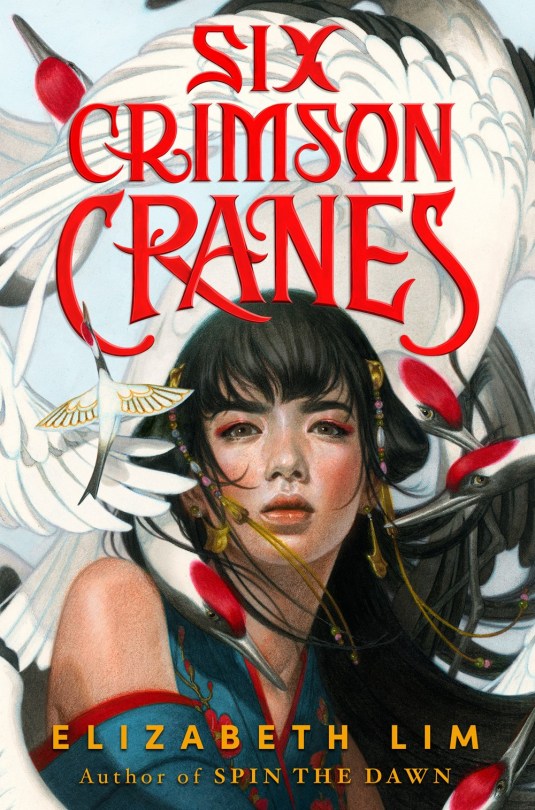
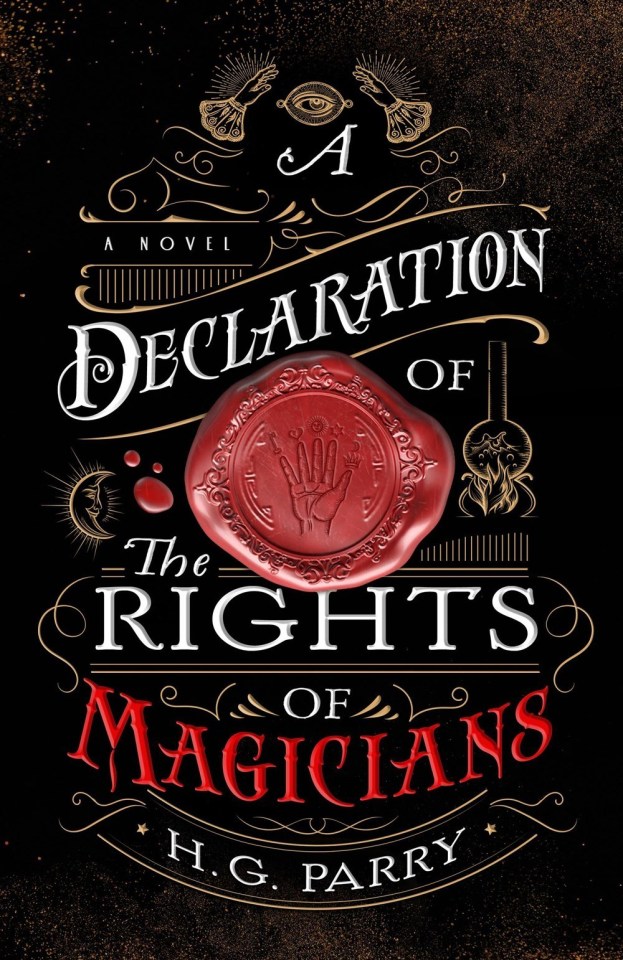
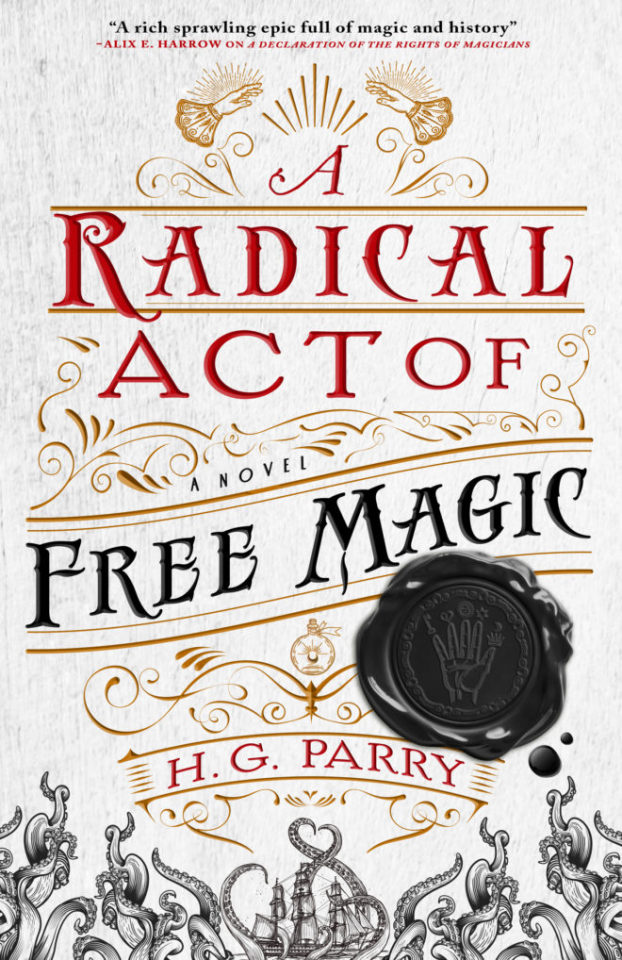
4.The Isles of the Gods (The Isles of the Gods 1) by Amie Kaufman 3/5 stars. This is a new young adult fantasy book that I've been looking forward to for a while. It was a fun, seafaring fantasy story, but I found it lacking in the characters and some aspects of the world-building. I did really enjoy the early 1900s industrial revolution setting-- I thought that was unique. While I found aspects of this book weak, I'll still probably read the next book (whenever it comes out). YA high fantasy.
5.The Beautiful Ones by Silvia Moreno-Garcia 4/5 stars. Whenever I pick up a new Silvia Moreno-Garcia I know that it's going to be quite different from the previous SGM book, but I know I'm most likely going to enjoy it. That was exactly the case with The Beautiful Ones. The beginning of this book took me a little while to get into, but once I was invested, I didn't want to put it down. The second half of this book was by far the strongest, and I really enjoyed the romance. Adult Historical Fantasy.
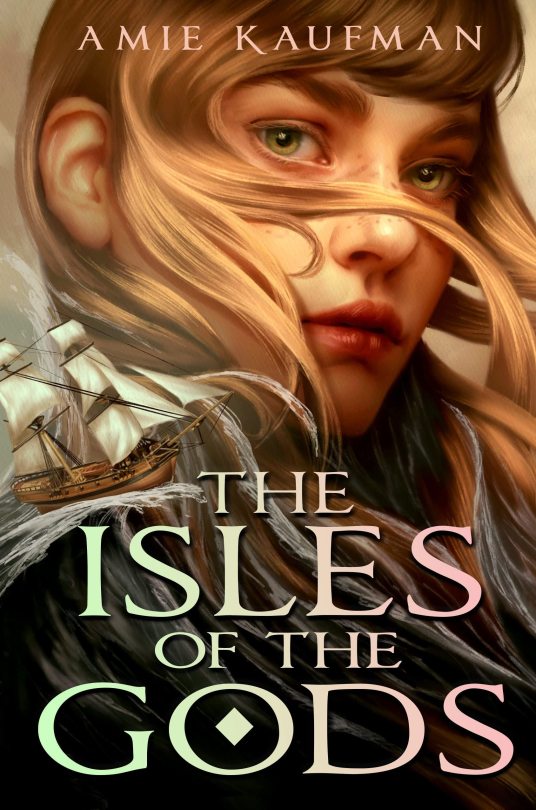
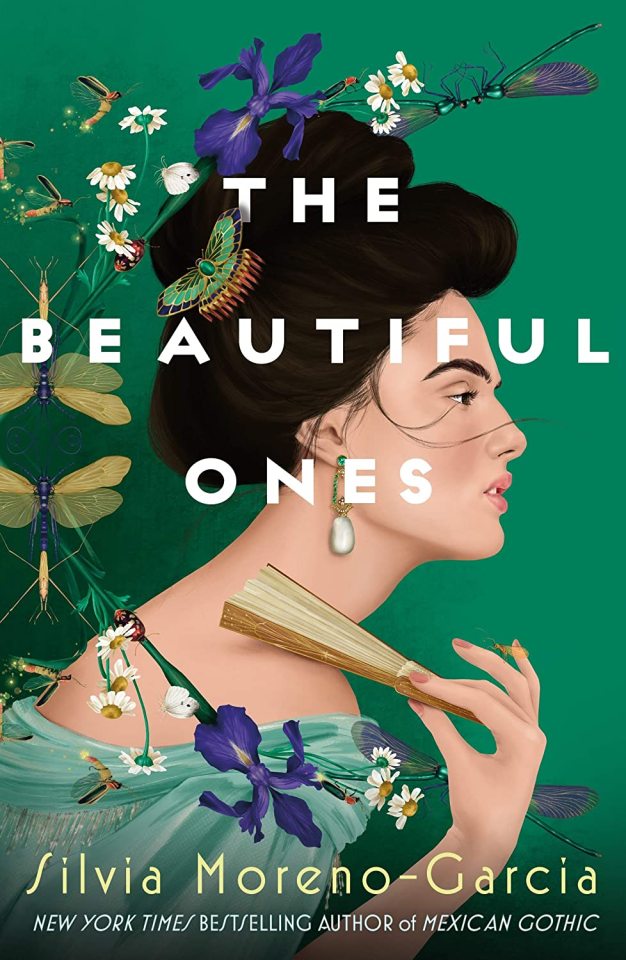
6.The Sea Around Us by Rachel Carson. This was my nonfiction, for the month and I wanted a literal beach read while at the beach. This is a foundational piece of nature literature by the prolific writer and conservationist Rachel Carson. This was published in 1950, so I'm not sure how much of the scientific detail is actually still accurate but I read this for the writing and the legacy of the work (there are so many good quotes and passages from this book too). Nonfiction.
7.Elantris by Brandon Sanderson 4/5 stars. In my slow attempt to read the Cosmere, I picked up this. I read this half on audio, half physical book. I ended up enjoying this much more than I thought I would. This may be one of my favorite Sanderson works that I've read. There were a lot of tropes and characters that I enjoyed. Adult high fantasy.
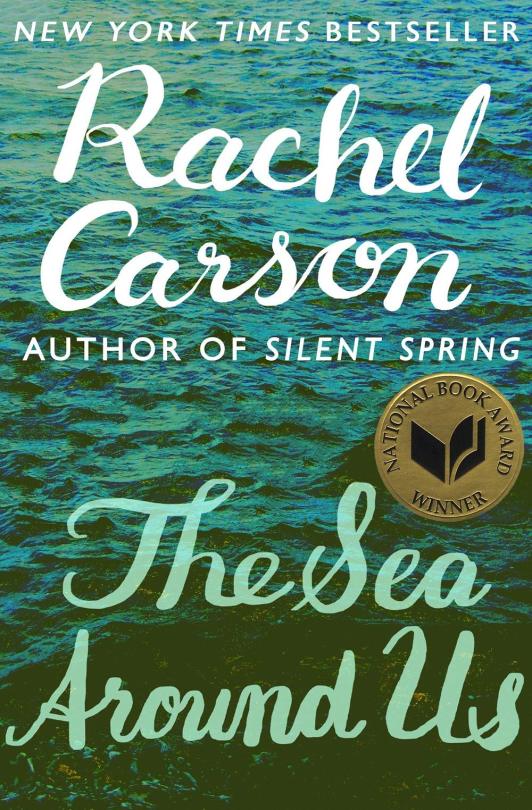
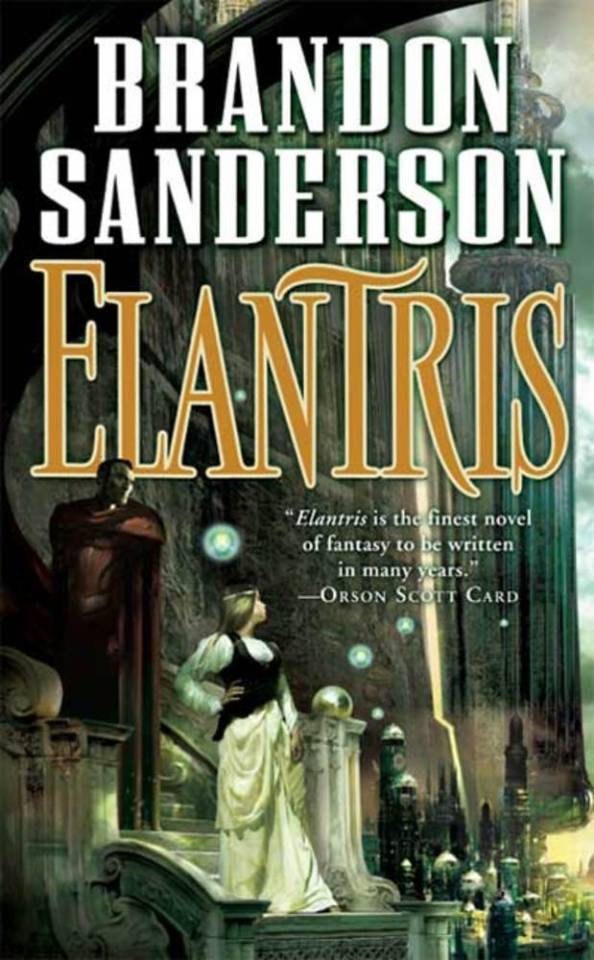
That's all for July! I'm looking forward to the books I'm planning on reading in August, included under the cut!
August books?
Fourth Wing by Rebecca Yarros
Skyhunter duology by Marie Lu
The Once and Future Witches by Alix E Harrow
11/22/63 by Stephen King
The Graveyard Book by Neil Gaiman
The Fifth Season by NK Jemison
#reading wrap up#july reading wrap up#books#fantasy books#brandon sanderson#elantris#six crimson cranes#elizabeth lim#a declaration of the rights of magicians#hg parry#the beautiful ones#silvia moreno garcia#books read#my post
18 notes
·
View notes
Text
Daenerys Targaryen, Martians, Eatable Ants and the Influence of The War of The Worlds on ASOIAF Part 3
January 18, 2023
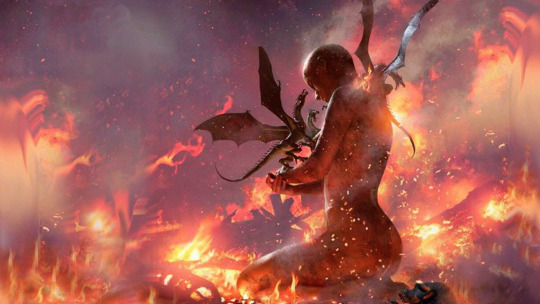
©Michael Komarck for the 2009 A Song of Ice and Fire Calendar
It’s been a long time coming, but here we are. After almost 4 years, I have finally completed my essay series on the influence of H.G Wells, The War of the Worlds (TWOTW) on A Song of Ice and Fire (ASOIAF). Before you begin, I should say that if you have not already done so, go back and first read parts one and two in the order they were written. This way, you get a better feel for the scope of what Martin has done in integrating TWOTW into his magnum opus.
In part one, I proposed that the Targaryens and their dragons represent the Martian invaders from Wells’ classic story and showed the numerous ways Martin compares them to visitors from the red planet. Then in part two, I dived deep into ants…how Wells and Martin used them in the same metaphoric way in their stories and what this might indicate about the future arc of Daenerys Targaryen.
Now in the final chapter, I take a closer look at how the Targaryen words fire and blood reverberate as deeply in TWOTW as it does in ASOIAF…pointing towards the conflagration that both the Martians and dragons will bring to the world. I also provide my theory on the location of Dany’s house with the red door and what it truly means to her and the in-world characters. Finally, I briefly discuss the clues in TWOTW that echo ones about Euron Greyjoy in ASOIAF and what they might potentially suggest about the convergence of his story with Dany’s. And so, let’s jump right in.
Fire and Blood and the Targaryen colors of red and black are not just motifs in ASOIAF. They are also layered throughout TWOTW. There is an overabundance of comparisons of the Targaryens and their dragons to the Martians in the text of ASOIAF. On the dragon side, this is especially true with Balerion and Drogon and their black fire. George plainly shows how it represents his version of Wells’ Martian’s Black Smoke.
As I noted in the post I made after the publication of part one of this essay series, George refers to Mars as the Blood and Fire planet, and wrote a long introduction for an anthology of Mars stories he edited where he discussed his lifelong fascination with the planet and its influence on him and and other writers of the genre.
Interestingly enough, he more recently mentioned in a blog post from March 2022 that he’s thinking of calling part two of F&B, Blood and Fire. This further supports my thesis that he has written the Targs as the Martians invaders of the story. ASOIAF is in a way, the story he says that he’s always wanted to write about Martians and the storied planet of Mars.
THE MARTIAN LANDSCAPE AND ASOIAF
As is the case in ASOIAF, the Targaryen words of Fire & Blood, and the colors of red and black are major motifs in TWOTW. From the beginning of the novel, Wells makes it clear that the Martians like George’s dragons were bringing a firestorm to the earth.
The storm burst upon us six years ago now. As Mars approached opposition, Lavelle of Java4 set the wires of the astronomical exchange palpitating with the amazing intelligence of a huge outbreak of incandescent gas upon the planet. It had occurred towards midnight of the twelfth; and the spectroscope, to which he had at once resorted, indicated a mass of flaming gas, chiefly hydrogen, moving with an enormous velocity towards this earth. This jet of fire had become invisible about a quarter past twelve. He compared it to a colossal puff of flame suddenly and violently squirted out of the planet, “as flaming gases rushed out of a gun.”
A singularly appropriate phrase it proved.
The War of the Worlds: The Eve of the War
I discussed many of the direct comparisons between the Targs and the Martians by George in part one. These include how the Martians’ cylinder like space ships were first thought to be meteors just like the Qarthian myth suggest was the case with the dragons of Planetos; the cylinders symbolically serving as eggs from which Martians are born on earth and how the crusted metal of their ship is described like the metallic scales on a dragon egg; the plethora of comparisons of both the Martians, Targs and their dragons to snakes; how both the dragons and Martians’ heat ray are described as swords above the world; the association of both to pits; and of course, the ants, the ants, the ants.

Elen11/Getty Images
Both Wells and George play with the idea blackness of space as a primordial sea. This is an idea that’s at the heart of many of the world’s myths and has been used by other fantasy and science fiction authors on numerous occasions.
Near it in the field, I remember, were three faint points of light, three telescopic stars infinitely remote, and all around it was the unfathomable darkness of empty space. You know how that blackness looks on a frosty starlight night. In a telescope it seems far profounder. And invisible to me because it was so remote and small, flying swiftly and steadily towards me across that incredible distance, drawing nearer every minute by so many thousands of miles, came the Thing they were sending us, the Thing that was to bring so much struggle and calamity and death to the earth.
The War of the Worlds: The Eve of the War
As the unnamed narrator looks through the telescope, it’s as if he is looking at the cosmic ocean, which is a theme that George plays with throughout ASOIAF regarding the weirwoods and being ‘under the sea.’ However, we are not here to discuss the primordial sea, but rather the emphasis put on red and black in both Wells and George’s work.
There is the blackness of space reference in the passage above, which the narrator is viewing at night from a night black observatory. There is the moving black mark on the cylinder that alerts Ogilvy to the fact that it is being opened from the inside.
And then he perceived that, very slowly, the circular top of the cylinder was rotating on its body. It was such a gradual movement that he discovered it only through noticing that a black mark that had been near him five minutes ago was now at the other side of the circumference. Even then he scarcely understood what this indicated, until he heard a muffled grating sound and saw the black mark jerk forward an inch or so. Then the Thing came upon him in a flash. The cylinder was artificial—hollow—with an end that screwed out! Something within the cylinder was unscrewing the top!
The War of the Worlds: The Falling Star
There is how Wells describes the crowd standing around the pit where the Martians were about to be born.
WHEN I RETURNED to the common the sun was setting. Scattered groups were hurrying from the direction of Woking, and one or two persons were returning. The crowd about the pit had increased, and stood out black against the lemon yellow of the sky—a couple of hundred people, perhaps.
The War of the Worlds: The Cylinder Opens
The sky turning yellow is a harbinger. A yellow sky means that a storm is brewing. This seems an apt metaphor considering what occurred on the sand dunes of Horsell Common.
Another way black is used as an important symbol is how Wells compares people to black ants as they flee from the Martians. I described the symbolic importance this in detail and how Martin uses them in the same metaphoric manner in his story, as well as what it implies about Dany’s future arc in the last chapter and so I will not do so again here.
There is also the black machine the Martians’ travel in from which they dispense their heat ray. Not surprisingly, the narrator describes it as a sword from above just as Xaro Xhoan Daxos describes Dany’s dragons.
It was sweeping round swiftly and steadily, this flaming death, this invisible, inevitable sword of heat. I perceived it coming towards me by the flashing bushes it touched, and was too astounded and stupefied to stir. I heard the crackle of fire in the sand pits and the sudden squeal of a horse that was as suddenly stilled. Then it was as if an invisible yet intensely heated finger were drawn through the heather between me and the Martians, and all along a curving line beyond the sand pits the dark ground smoked and crackled. Something fell with a crash far away to the left where the road from Woking station opens out on the common. Forthwith the hissing and humming ceased, and the black, domelike object sank slowly out of sight into the pit.
The War of the Worlds: The Heat Ray
However, the most important black motif I want to discuss is the Martian black smoke. This is most heavily crystallized in ASOIAF with Balerion the Black Dread, Drogon, and their black fire. Their fire, which produces black smoke is the symbolic stand-in for the Martian black smoke.
And from this paper my brother read that catastrophic despatch of the Commander-in-Chief:
“The Martians are able to discharge enormous clouds of a black and poisonous vapour by means of rockets. They have smothered our batteries, destroyed Richmond, Kingston, and Wimbledon, and are advancing slowly towards London, destroying everything on the way. It is impossible to stop them. There is no safety from the Black Smoke but in instant flight.
“Black Smoke!” the voices cried. “Fire!”
The bells of the neighbouring church made a jangling tumult…”
The War of the Worlds: In London

Credit: by Brendan Perkins via Lonesome Crow on DeviantArt
Note the ringing of the bells echo in response to the call of fire. We know that bells will have an important role to play in Jon Connington’s arc, and it likely will not be good news for the people. Bells also play a role in Dany’s arc in the books via the bells the Dothraki wear in their hair. This is especially important tool of fear for the Khals like Drogo.
Dany braided his hair and slid the silver rings onto his mustache and hung his bells one by one. So many bells, gold and silver and bronze. Bells so his enemies would hear him coming and grow weak with fear.
A Game of Thrones, Daenerys X
In real life whether via the church bells of distant eras, or the more recent past of bells on fire trucks, the clanging instruments have alerted the populace that there was a fire in their midst.
On the show, like was the case with the Martians in TWOTW, bells herald the start of Dany’s fiery destruction of Kings Landing. Will something similar happen in the books after the Khaleesi becomes the “stallion who mounts the world?” Only time will tell.
As Balerion and Drogon discharge their black flame onto cities and the populace, the Martians do the same. Only, they discharge their heat ray and black smoke from their walking tripods and flying machines via rockets. Whether via the dragons or the Martian machines, the powerful force of fire and smoke have similar results when used against people…immediate death.
Now here is an extremely interesting detail. The description of the Martian black smoke eerily mirrors the description of Drogon’s fire. In fact, except for a couple of words, it’s almost exactly the same.
In front was a quiet, sunny landscape, a wheat field ahead on either side of the road, and the Maybury Inn with its swinging sign. I saw the doctor’s cart ahead of me. At the bottom of the hill I turned my head to look at the hillside I was leaving. Thick streamers of black smoke shot with threads of red fire were driving up into the still air, and throwing dark shadows upon the green treetops eastward.”
The War of the Worlds: The Fighting Begins
And now here is a description of Drogon’s fire.
Above them all the dragon turned, dark against the sun. His scales were black, his eyes and horns and spinal plates blood red. Ever the largest of her three, in the wild Drogon had grown larger still. His wings stretched twenty feet from tip to tip, black as jet. He flapped them once as he swept back above the sands, and the sound was like a clap of thunder. The boar raised his head, snorting … and flame engulfed him, black fire shot with red.
ADWD, Daenerys IX
The Martians’ black smoke is shot through with red fire, while Drogon’s black fire is shot through with red. When you consider all the many other ways George compares the dragons to the Martians, the similarities in the description of these two fiery characteristics cannot be mere happenstance. It’s a deliberate comparison on George’s part.
The Martian black smoke poisons all living things it touches, while Drogon’s fire destroys everything it burns. For all practical purposes, the two are the same and both results in ashes.
And all being quiet throughout the afternoon, we started about five o’clock, as I should judge, along the blackened road to Sunbury.
In Sunbury, and at intervals along the road, were dead bodies lying in contorted attitudes, horses as well as men, overturned carts and luggage, all covered thickly with black dust. That pall of cindery powder made me think of what I had read of the destruction of Pompeii.
The War of the Worlds: Under Foot
I mentioned in part two that the description of this scene reads very much like what we saw on the show of Kings Landing after it was burnt by Dany, and what we will likely see in next book after she burns much of Essos. Also, while the black smoke is separate from the Martian heat ray, the two are often used as one.
The Martians’ black smoke is poisonous, but dragon fire likely has a similar effect on burnt cities in the immediate aftermath of its fiery destruction. Residents in such locations would find it very difficult to breath and if they lived in modern times, many would later be diagnosed with cancer, as with the case of those who lived in the downtown area of New York City after 9/11. Basically, if not resulting in immediate death, the aftereffects of fire from Balerion, Drogon and the other dragons is like a slow poison.
The Targaryen House sword carried by Aegon the Conqueror is name Blackfyre, which mirrors the description of Drogon’s flame. We have not yet seen Blackfyre on the page and have not been given a detail description of its color.
Although we can assume it is like the dark grey of House Starks Valyrian sword Ice and other such blades, I suspect that Blackfyre will be even darker…closer to black as the name implies with threads of red…Targaryen colors. It will be the total opposite to the milk glass color of Dawn, a sword the future wielder of Blackfyre seems destined to meet across the battlefield.
So now that we’ve talk about the symbolic importance of black as a motif in both books, and why Balerion and Drogon’s fire are meant to mirror the Martians’ black smoke, let’s move on to red. We will begin in the Red Waste, George’s version of the Martian landscape through which Dany travels to Qarth.
Like the meteor that herald the arrival and birth of the Martians on earth, one does the same for the birth of Dany’s dragon at the edge of the Red Waste. Dany took this as a portent from the gods and led her followers after the red comet through the waste.
The Dothraki named the comet shierak qiya, the Bleeding Star. The old men muttered that it omened ill, but Daenerys Targaryen had seen it first on the night she had burned Khal Drogo, the night her dragons had awakened. It is the herald of my coming, she told herself as she gazed up into the night sky with wonder in her heart. The gods have sent it to show me the way.
Yet when she put the thought into words, her handmaid Doreah quailed. “That way lies the red lands, Khaleesi. A grim place and terrible, the riders say.”
“The way the comet points is the way we must go,” Dany insisted … though in truth, it was the only way open to her.”
ACOK, Daenerys I
Much of what Wells speculated about the red planet…so called because of the color of the dust that layers it surface, and what scientists of the time proposed have since proven to be incorrect. However, one thing that remains constant from then to today is that of Mars is a dry, sandy red waste whose seas have dried up. Here is Wells’ version of the planet.
The secular cooling that must someday overtake our planet has already gone far indeed with our neighbour. Its physical condition is still largely a mystery, but we know now that even in its equatorial region the midday temperature barely approaches that of our coldest winter. Its air is much more attenuated than ours, its oceans have shrunk until they cover but a third of its surface, and as its slow seasons change huge snowcaps gather and melt about either pole and periodically inundate its temperate zones. That last stage of exhaustion, which to us is still incredibly remote, has become a present-day problem for the inhabitants of Mars.
The War of the Worlds: The Eve of War

The Bonneville Crater on Mars NASA/JPL/Cornell University
And here is George’s version of the Martian landscape.
There was little forage in the red waste, and less water. It was a sere and desolate land of low hills and barren windswept plains. The rivers they crossed were dry as dead men’s bones. Their mounts subsisted on the tough brown devilgrass that grew in clumps at the base of rocks and dead trees. Dany sent outriders ranging ahead of the column, but they found neither wells nor springs, only bitter pools, shallow and stagnant, shrinking in the hot sun. The deeper they rode into the waste, the smaller the pools became, while the distance between them grew. If there were gods in this trackless wilderness of stone and sand and red clay, they were hard dry gods, deaf to prayers for rain.
ACOK, Daenerys I
George’s red waste is dry and desolate but more like the real Mars than Wells whose telescopic instruments were not as technologically as advance as the ones today. However, the two are pretty close. George’s red waste, like Wells’ Mars, has little to no water, and what it does have is undrinkable. Nonetheless, the desperate travelers have no other choice but to drink it. The land is also filled with fiery dragon like symbolism with the sun beating down and the extra hot water smelling of brimstone.
The next pool they found was scalding hot and stinking of brimstone, but their skins were almost empty. The Dothraki cooled the water in jars and pots and drank it tepid. The taste was no less foul, but water was water, and all of them thirsted. Dany looked at the horizon with despair. They had lost a third of their number, and still the waste stretched before them, bleak and red and endless.
ACOK, Daenerys I
While, initially, they refused to eat because their meat was not charred, after Dany figured out this was the problem, her dragons ate and thrived. Unliked her followers.
Yet even as her dragons prospered, her khalasar withered and died. Around them the land turned ever more desolate. Even devilgrass grew scant; horses dropped in their tracks, leaving so few that some of her people must trudge along on foot. Doreah took a fever and grew worse with every league they crossed. Her lips and hands broke with blood blisters, her hair came out in clumps, and one evenfall she lacked the strength to mount her horse. Jhogo said they must leave her or bind her to her saddle, but Dany remembered a night on the Dothraki sea, when the Lysene girl had taught her secrets so that Drogo might love her more. She gave Doreah water from her own skin, cooled her brow with a damp cloth, and held her hand until she died, shivering. Only then would she permit the khalasar to press on.
ACOK, Daenerys I
Doreah, the handmaiden who warned Dany against crossing the red waste is one of the earliest of Dany’s followers to die, but Dany’s dragons are getting stronger. This makes symbolic sense as the dragons are the Martians of the story, and thus should thrived in the place of their birth. But of course, like the Martian invaders, their food and water supply are depleting and so they need another source of nourishment.
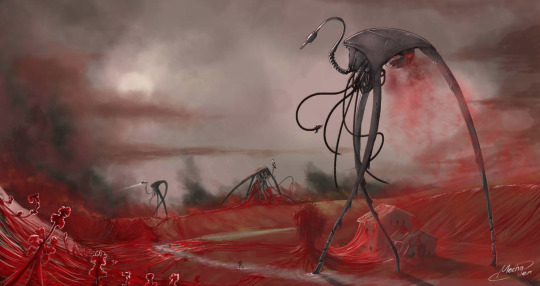
The Red Weed by Mechagen_Deviant Art_
The Martians bring with them a red weed that pretty much overtakes the landscape. It’s not clear whether they deliberately planted the weed or if it accidentally hatched a ride on their cylinders, got into the earth ecosystem and then proliferated.
And speaking of the differences between the life on Mars and terrestrial life, I may allude here to the curious suggestions of the red weed.
Apparently the vegetable kingdom in Mars, instead of having green for a dominant colour, is of a vivid blood-red tint. At any rate, the seeds which the Martians (intentionally or accidentally) brought with them gave rise in all cases to red-coloured growths. Only that known popularly as the red weed, however, gained any footing in competition with terrestrial forms. The red creeper was quite a transitory growth, and few people have seen it growing. For a time, however, the red weed grew with astonishing vigour and luxuriance. It “spread up the sides of the pit by the third or fourth day of our imprisonment, and its cactus-like branches formed a carmine fringe to the edges of our triangular window. And afterwards I found it broadcast throughout the country, and especially wherever there was a stream of water.”
The War of the Worlds: What We Saw from the Ruined House
As he has woven the story of the Martians so indelibly into Dany’s arc of ASOIAF, one would expect that George has also included something like the iconic red weed in his story and that it would be associated with Dany. And low and behold, he has done just that as Jorah describes to Dany how the Dothraki Sea looks at certain times of the year.
It was a sea, Dany thought. Past here, there were no hills, no mountains, no trees nor cities nor roads, only the endless grasses, the tall blades rippling like waves when the winds blew. "It's so green," she said.
"Here and now," Ser Jorah agreed. "You ought to see it when it blooms, all dark red flowers from horizon to horizon, like a sea of blood. Come the dry season, and the world turns the color of old bronze.
A Game of thrones, Daenerys III
It’s funny that George, describes the dark red flowers of his story like a sea of blood because Wells does something similar in his. He doesn’t specifically call it a sea, but he associates it with blood in a different way.
My first action coming to this water was, of course, to slake my thirst. I drank a great deal of it and, moved by an impulse, gnawed some fronds of red weed; but they were watery, and had a sickly, metallic taste.
The War of the Worlds: The Work of Fifteen Days
Blood of course tastes metallic because of its iron rich hemoglobin content, and so when Wells describes the red weed as tasting like metal, he wants you to think of blood.
Blood is another way that red as a motif plays an important role in the story. Like the many references to fire and black smoke from Martian weapons, Wells has numerous scenes where blood is heavily featured throughout the text.
The narrator often comes across the aftereffects of bloody scenes; people are often shown injured or getting into fights where they bleed; or in a blood rage as they fight each other for the scraps of survival. It’s to show that underneath the humans are not that different from the Martians.
However, it’s also to highlight the main reason the Martian’s came to earth. They invaded because they were looking for a new food source. Just like Dany and her followers in the Red Waste, theirs was depleted on Mars. And they found it in human blood.
They did not eat, much less digest. Instead, they took the fresh living blood of other creatures, and injected it into their own veins. I have myself seen this being done, as I shall mention in its place. But, squeamish as I may seem, I cannot bring myself to describe what I could not endure even to continue watching. Let it suffice to say, blood obtained from a still living animal, in most cases from a human being, was run directly by means of a little pipette into the recipient canal….
The War of the Worlds: What We Saw from the Ruined House
Red also appears in some trees the narrator encounters. There is a that while much smaller in nature than the Wall in ASOIAF, the narrator finds difficult to cross. When he does, he encounters some trees that are overgrown by the Martian red weed that has overtaken the land. The description of the trees as he walks underneath them can’t help but make one think of the weirwoods.
In the direction away from the pit I saw, beyond a red-covered wall, a patch of garden ground unburied. This gave me a hint, and I went knee-deep, and sometimes neck-deep, in the red weed. The density of the weed gave me a reassuring sense of hiding.
The wall was some six feet high, and when I attempted to clamber it I found I could not lift my feet to the crest. So I went along by the side of it, and came to a corner and a rockwork that enabled me to get to the top, and tumble into the garden I coveted.
Here I found some young onions, a couple of gladiolus bulbs, and a quantity of immature carrots, all of which I secured, and, scrambling over a ruined wall, went on my way through scarlet and crimson trees towards Kew—it was like walking through an avenue of gigantic blood-drops—possessed with two ideas: to get more food, and to limp, as soon and as far as my strength permitted, out of this accursed unearthly region of the pit.
The War of the Worlds: The Work of Fifteen Days
As I said, red is one of the most important motifs in TWOTW, and it is meant to signify danger from the Martians. It usually heralds their arrival or indicates their presence in the vicinity. There is the fire and blood, and red weed that I’ve already discussed, but red also appears symbolically in lights.
OF RED DOORS AND LEMON TREES
When the announcement is made that the Martians have arrived in London, a red light shines in from outside on to the ceiling of the room of the narrator’s brother. A couple of times, the narrator also sees red searchlights and a red glow in the vicinity where the Martians are located. Red is a warning both in TWOTW and in ASOIAF, which brings me to Dany’s red door.
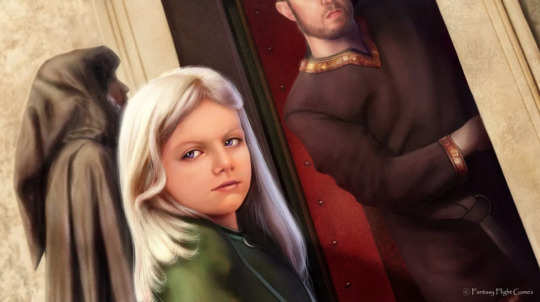
Credit: Tiziano Baracchi. © Fantasy Flight Games...via Deviant Art
All that Daenerys wanted back was the big house with the red door, the lemon tree outside her window, the childhood she had never known.
A Game of Thrones, Daenerys I
For Dany, this house with the red door represents a lost childhood and a time when she was happy. The longing to find this house with the red door is palpable throughout her arc. However, while on this surface, this seems like simply the dream of a lost and hurt child, I think that it and its color represent more.
As with Wells use of red in his story and George’s use of it in the house color of the Targaryen, I think Dany’s door being red is a warning to the reader to beware…that there is more to this symbolism than meets the eye. On a Watsonian level, Dany’s red door is also a warning to her about the danger she represents to the world of Planetos. Let’s dig in.
A few years ago, I wrote a thread on Twitter where I broke down what I think Dany’s red door means. I still hold to this theory and so I’ll copy and paste here with just a few minor corrections.
Why did George make the symbol of Dany's quest for home a red door? Well, aside from symbolically using red as a similar motif as Wells in TWOTW, I think it ties into the biblical story of the Passover. It’s the story of the world’s first known symbolic red door and you can read about it below.
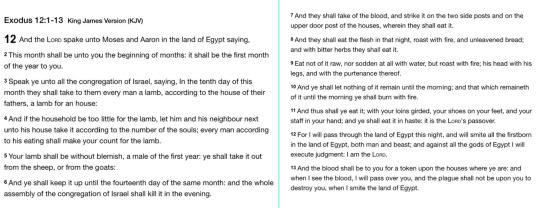
I should mention that I'm Episcopalian and the red door on our church is what made me associate Dany's door with the religious aspect of the biblical Passover. Red doors are also used on most Catholic Churches.
Red on church doors is supposed to represent a place of sanctuary. However, this is often not the case. The church and its priest not providing sanctuary is also a theme in TWOTW, but that’s a topic for another essay. My point is that George is a lapse Catholic and I’m sure he’s aware of the symbolism behind red doors and that institutional religion is often not a sanctuary.
Keeping the story of the Passover you just read in mind, what might it symbolically imply about Dany's arc and her quest for the red door? And why did dream turn into a nightmare the one time in the story she made it behind the door.
She could smell home, she could see it, there, just beyond that door, green fields and great stone houses and arms to keep her warm, there. She threw open the door.
“… the dragon …”
And saw her brother Rhaegar, mounted on a stallion as black as his armor. Fire glimmered red through the narrow eye slit of his helm. “The last dragon,” Ser Jorah’s voice whispered faintly. “The last, the last.” Dany lifted his polished black visor. The face within was her own.
After that, for a long time, there was only the pain, the fire within her, and the whisperings of stars.
She woke to the taste of ashes.
A Game of Thrones, Daenerys IX
Note George’s consistent use of black with red fire to echo both the Martian black smoke and Drogon’s flame. Based on the biblical scripture, to make it behind the red door is to be protected from the Lord's vengeance. He sent the angel of death during the night to kill all the first born of Egypt...be they people or animals. Only his people who obeyed his command to mark their door with the blood of a lamb no older than a year were protected when the angel of death came. The angel passed them over. The red door in this instance thus symbolizes protection.
However, not in the case of Dany. The protection of the red door is not available to her. And sadly, it probably never was. At least it won’t if Quaithe has her way. She emphasizes it in this and other dreams that she sends the dragon queen. Dany is the angel of death who does not belong behind the red door with the populace.
The only time Dany makes it behind the door, it occurs in her dreams, and it becomes a nightmare. She opens Rhaegar’s helm and sees not her brother, but herself. This should be a happy moment. She’s made it to home and behind the red door, where she is supposed to be safe, but of course, it’s not.
She is the angel of death and thus her being behind the red door indicates that she is a threat to the humans. Thus, her dream becomes a nightmare that foreshadows her future arc. It’s why she wakes to the taste of ashes.
But it was not the plains Dany saw then. It was King's Landing and the great Red Keep that Aegon the Conqueror had built. It was Dragonstone where she had been born. In her mind's eye they burned with a thousand lights, a fire blazing in every window. In her mind's eye, all the doors were red.
A Game of Thrones, Daenerys III
On the surface, longing for Kings Landing is just that, a longing for the home of her recent ancestors...a place she can call home. However, underneath, it maybe foreshadowing something much darker...potentially her burning of Kings Landing as on the show.
Dany’s red door and her "wake the dragon dream" have always been a signpost indicating where her story was going. The red door was never about home for her. Sadly, it’s just the opposite.
Dany thinks of herself as a god when flying Drogon in her last chapter of ADWD and so in a way, she is also the Lord sending the angel of death...in this case, Drogon among the populace.
By the way, George writes Drogon as "passing over" but Dany called him back to use him to bring the Dothraki to heel. Left alone to run wild, Drogon would have killed animals and some humans but for food only. It is in Dany’s hands, as was the case with past Targaryens and dragon lords that the beasts become weapons of mass destruction.
Thrice that day she caught sight of Drogon. Once he was so far off that he might have been an eagle, slipping in and out of distant clouds, but Dany knew the look of him by now, even when he was no more than a speck. The second time he passed before the sun, his black wings spread, and the world darkened. The last time he flew right above her, so close she could hear the sound of his wings.
A Dance with Dragons, Daenerys X
Later in the chapter after hearing Quaithe voice again in the stars, she decides to follow the shadowbinder’s advice and accept her dragon heritage.
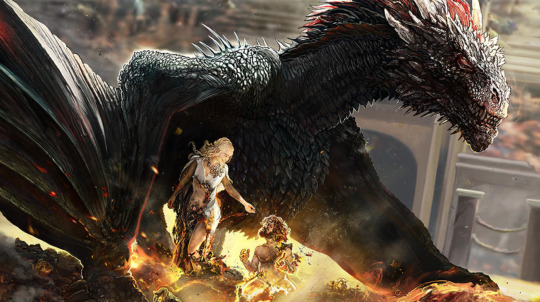
DanceOfDragons_by_ertacaltinoz_DeviantArt
Dany watched him go. When the sound of his hooves had faded away to silence, she began to shout. She called until her voice was hoarse … and Drogon came, snorting plumes of smoke. The grass bowed down before him. Dany leapt onto his back. She stank of blood and sweat and fear, but none of that mattered. “To go forward I must go back,” she said. Her bare legs tightened around the dragon’s neck. She kicked him, and Drogon threw himself into the sky. Her whip was gone, so she used her hands and feet and turned him north by east, the way the scout had gone. Drogon went willingly enough; perhaps he smelled the rider’s fear.
A Dance with Dragons - Daenerys X
Dany calls Drogon back to her and claims her dragon identity and he recognizes this change. Thus, she no longer needs a whip to control him. He now goes where she wants.
So, if Dany’s red door is meant to be seen as a warning, is it real or just a symbolic figment of her imagination. I think the answer is yes, it is real, but it also potentially a figment. What do I mean? Well, let’s first determine where the house with the red door is located.
I’m going to be as short as possible in this section as this chapter is already overlong. The topic of the red door probably deserves its own essay, but I don’t have the time to write it. There are also a couple of other important points about the influence of TWOTW on the story that I want to get to…including a brief discussion of Euron.
For years, the location of the house with the red door has been a hot topic of conversation in the fandom because, Dany says the house was in Braavos. The confusion arises because in her memory, Dany also remembers a lemon tree growing outside her window. The problem with this memory is that lemon trees and trees in general do not grow in the stone city of Braavos. I’m not going to go into the reasons why as most anyone who has read the books already know the answer, but the basic reason is a lack of irrigated water.
Some sides of the fandom have proposed that yes, Dany was raised in Braavos…at the Palace of the Sealord. He is rich and is said by Syrio Florel among others to have exotic creatures walking the grounds of his estate. Thus, if anyone resident could be said to be able to afford to have an irrigated system to channel water from the canals, it would be the Sealord. Thus, maybe it’s possible that Dany is remembering a house on the Sealord’s estate. Or maybe not.
Doran Martell also tells his daughter Arianne that she was promised to Dany’s brother Viserys as bride. An agreement signed and witness by Oberyn for House Martell and the Sealord as representative for Viserys. There seems to be no reason for Doran to lie about this story, and it fits with his tendency to play the long game. The Sealord also never leaves Braavos, and so, if such a pact was signed, it must have happened in that city and Dany and Viserys must have resided there. If not, why would the Sealord bear witness. This also supports the theory that Dany is remembering the Sealord’s house. But then again, maybe not.
Another popular option proposed by fans is that Dany was hidden away and raised in Dorne and that’s where the pact was signed. After all, it’s established on multiple ocassions in the text that Dorne is where lemon trees grow. It’s mentioned so often that I see it as one of George’s shiny apples. And by that, I mean that he hides the truth in plain sight and then by sleight of hand, makes the reader look in another direction. There are a lot of shiny apples in the text, and one day, I may write an essay about them.
I say that Dorne and the lemon trees that grow there are a shiny apple because I think that Dany was raised exactly where she says she was…in Braavos. Only, I don’t think that it was at the Sealord’s Palace. If not there, the question then becomes where?
Well, I think that the answer can be found in Dany’s dreams and the one constant other than Jorah, and her Dothraki khalasar that have been with her throughout her story thus far…Quaithe, the shadowbinder from Asshai. Quaithe is not always there with Dany in person, but her presence is always felt.
In AGOT, the stars whisper to Dany during her wake the dragon dream as I showed in the passage I posted above. We don’t know then that it’s Quaithe but we start getting an inkling that she will have an important role to play in Dany’s story when she shows up in person in A Clash of Kings.
The woman in the lacquered wooden mask said in the Common Tongue of the Seven Kingdoms, "I am Quaithe of the Shadow. We come seeking dragons."
"Seek no more," Daenerys Targaryen told them. "You have found them."
______
Last of the three seekers to depart was Quaithe the shadowbinder. From her Dany received only a warning. "Beware," the woman in the red lacquer mask said.
"Of whom?"
"Of all. They shall come day and night to see the wonder that has been born again into the world, and when they see they shall lust. For dragons are fire made flesh, and fire is power."
When Quaithe too was gone, Ser Jorah said, "She speaks truly, my queen . . . though I like her no more than the others."
A Clash of Kings, Daenerys II
Quaithe turns up again a little later in ACOK, this time with a warning and a bit of cryptic advice for Dany.
“The woman took a step backward. “You must leave this city soon, Daenerys Targaryen, or you will never be permitted to leave it at all.”
Dany’s wrist still tingled where Quaithe had touched her. “Where would you have me go?” she asked.
“To go north, you must journey south. To reach the west, you must go east. To go forward you must go back, and to touch the light you must pass beneath the shadow.”
Asshai, Dany thought.
A Clash of Kings, Daenerys III
By the way, I think that Quaithe’s riddle is another of George’s shiny apple, and I’ll discuss why if I ever write that essay on the topic.
Dany next has an encounter with Quaithe in A Storm of Sword, only this time she is not there in person, but instead communicates with Dany via a glass candle and again peppers her with the cryptic riddle.
She woke suddenly in the darkness of her cabin, still flush with triumph. Balerion seemed to wake with her, and she heard the faint creak of wood, water lapping against the hull, a footfall on the deck above her head. And something else.
Someone was in the cabin with her.
“Irri? Jhiqui? Where are you?” Her handmaids did not respond. It was too black to see, but she could hear them breathing. “Jorah, is that you?”
“They sleep,” a woman said. “They all sleep.” The voice was very close. “Even dragons must sleep.”
She is standing over me. “Who’s there?” Dany peered into the darkness. She thought she could see a shadow, the faintest outline of a shape. “What do you want to me?”
“Remember. To go north, you must journey south. To reach the west, you must go east. To go forward you must go back, and to touch the light you must pass beneath the shadow.”
“Quaithe?” Dany sprung from the bed and threw open the door. Pale yellow lantern light flooded the cabin, and Irri and Jhiqui sat up sleepily.
A Storm of Swords, Daenerys III
She next has two encounters with Quaithe is in ADWD.
“They sleep,” came the answer.
A woman stood under the persimmon tree, clad in a hooded robe that brushed the grass. Beneath the hood, her face seemed hard and shiny. She is wearing a mask, Dany knew, a wooden mask finished in dark red lacquer. “Quaithe? Am I dreaming?” She pinched her ear and winced at the pain. “I dreamt of you on Balerion, when first we came to Astapor.”
“You did not dream. Then or now.”
“What are you doing here? How did you get past my guards?”
“I came another way. Your guards never saw me.”
“If I call out, they will kill you.”
“They will swear to you that I am not here.”
“Are you here?”
“No. Hear me, Daenerys Targaryen. The glass candles are burning.
________
“If you have some warning for me, speak plainly. What do you want of me, Quaithe?”
Moonlight shone in the woman’s eyes. “To show you the way.”
A Dance with Dragon, Daenerys II
Does it seem as if Quaithe wants Dany to trust only her? It does to me.
Dany’s final encounter with Quaithe happens in her last chapter of ADWD. And it is here that we get confirmation that she has always been the whisperer of stars in Dany’s dreams.
She dreamed. All her cares fell away from her, and all her pains as well, and she seemed to float upward into the sky. She was flying once again, spinning, laughing, dancing, as the stars wheeled around her and whispered secrets in her ear. "To go north, you must journey south. To reach the west, you must go east. To go forward, you must go back. To touch the light you must pass beneath the shadow."
"Quaithe?" Dany called. "Where are you, Quaithe?"
Then she saw. Her mask is made of starlight.
"Remember who you are, Daenerys," the stars whispered in a woman's voice. "The dragons know. Do you?"
A Dance with Dragons, Daenerys X
Dany perceives Quaithe as speaking to her via the stars, whispering as it were. Thus, we realize that when the stars whispered to her during her wake the dragon dream back in A Game of Thrones, it was likely Quaithe at that time as well, communicating with Dany via a glass candle.
"What feeds the flame?" asked Sam.
"What feeds a dragon's fire?" Marwyn seated himself upon a stool. "All Valyrian sorcery was rooted in blood or fire. The sorcerers of the Freehold could see across mountains, seas, and deserts with one of these glass candles. They could enter a man's dreams and give him visions, and speak to one another half a world apart, seated before their candles. Do you think that might be useful, Slayer?"
"We would have no more need of ravens."
A Feast for Crows, Sam V
I fully expect to discover that Marwyn knows Quaithe. After all, we know from Miri Maz Duur that he was in Asshai. He is the one who taught her about the human body. I suspect that Quaithe in turn taught Marwyn, and a lot more than just the secrets of the body. After all, Quaithe is a shadowbinder from Asshai, where dragons are said to come from and which others in the fandom have proposed, may have been the ancient capital of the Great Empire of the Dawn. A theory that I endorse.
In Dany’s “wake the dragon” dream, Quaithe sends her a vision of her ancestors. Why?
Ghosts lined the hallway, dressed in the faded raiment of kings. In their hands were swords of pale fire. They had hair of silver and hair of gold and hair of platinum white, and their eyes were opal and amethyst, tourmaline and jade. "Faster," they cried, "faster, faster." She raced, her feet melting the stone wherever they touched. "Faster!" the ghosts cried as one, and she screamed and threw herself forward. A great knife of pain ripped down her back, and she felt her skin tear open and smelled the stench of burning blood and saw the shadow of wings. And Daenerys Targaryen flew.
A Game of Thrones, Daenerys IX
George gave us a bit more history on these ancient Targaryen ancestors when he dropped this ditty in TWOIAF history book.
Dominion over mankind then passed to his eldest son, who was known as the Pearl Emperor and ruled for a thousand years. The Jade Emperor, the Tourmaline Emperor, the Onyx Emperor, the Topaz Emperor, and the Opal Emperor followed in turn, each reigning for centuries...yet every reign was shorter and more troubled than the one preceding it, for wild men and baleful beasts pressed at the borders of the Great Empire, lesser kings grew prideful and rebellious, and the common people gave themselves over to avarice, envy, lust, murder, incest, gluttony, and sloth.
When the daughter of the Opal Emperor succeeded him as the Amethyst Empress, her envious younger brother cast her down and slew her, proclaiming himself the Bloodstone Emperor and beginning a reign of terror. He practiced dark arts, torture, and necromancy, enslaved his people, took a tiger-woman for his bride, feasted on human flesh, and cast down the true gods to worship a black stone that had fallen from the sky. (Many scholars count the Bloodstone Emperor as the first High Priest of the sinister Church of Starry Wisdom, which persists to this day in many port cities throughout the known world).
The World of Ice and Fire, The Bones – Beyond YiTi
Based on the similarity in the descriptions of the ancient people from the GEOTD to the ancestors in Dany’s vision, the fandom, I think correctly assumed that they are one and the same. I propose that their appearance in Dany’s vision isn’t just about a generic ancestral line, but rather to clue us in that Targaryen genetic blood line can be traced all the way back to the Bloodstone Emperor.
In fact, I think that the Blackfyre is the first Valyrian steel blade. It’s the red “sword of heroes” Melisandre constantly references, and its heritage can be traced all the way back to the Bloodstone Emperor. The blood of the Amethyst Empress or Nissa Nissa, if you want to call her that went into the forging of that sword. There is more to it than just the forging of the sword as it also had to do with the BE’s attempt to gain access to the weirwoods, but I think that Blackfyre is his sword, and it has been passed down through the Targaryen line since then.
All the dark arts referenced in the history books are still practiced in the Shadowlands from where Quaithe hails. Quaithe whispering to Dany through the stars, strongly suggests as others have proposed that she is a member of the Church of Starry Wisdom originally started by the BE. I also think that the church has been keeping a close on and watching over the Targs through the many generations since the height of the GEOTD, and it was a member of the church who sent the dreams to Daenys the Dreamer about the coming fall of Valyria.
I would not be surprised to discover that the church was somehow involved with what happened in Valyria. I think that their goal is again to attempt the deepest of the dark arts, and Dany is the unknowing guinea pig to help Quaithe and other senior members of the church achieve their goals.
Also, Dany’s ability to hear the whispering through the stars, suggests that she may have been unknowingly exposed to the church’s trainings. And I don’t mean that she’s literally hearing thoughts through the stars. It’s about symbolism and her knowing to associate Quaithe with them.
Therefore, I proposed that the house with the red door she remembers, is the Church of Starry Wisdom in Braavos. The red door is either the entrance door or on a building on the church’s estate. It was there that Dany picked up some unknowing little knowledge about scrying to the stars…maybe even by using a glass candle.
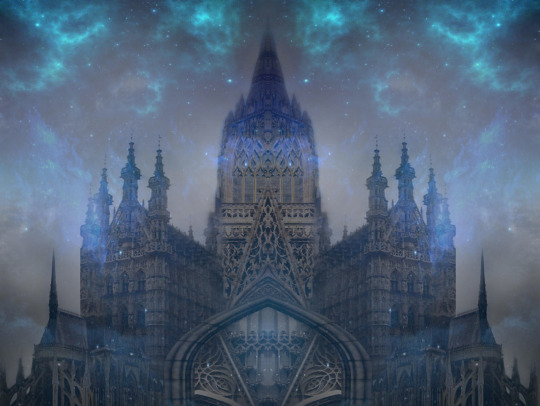
Church of Starry Wisdom by Cyprus-1 - Deviant Art
As I stated up thread, red doors are often associated with churches. However, we don’t know the color of the one on the door of the COSW in Braavos. The only reference we have to it in the text is from Arya when she walks by as Blind Beth.
As she made her way past the temples, she could hear the acolytes of the Cult of Starry Wisdom atop their scrying tower, singing to the evening stars.
A Dance with Dragons, The Blind Girl
The door to the church could be red. We don’t know. However, I don’t think that it is. I think that the red door that Dany remembers is an interior one…behind the main entrance.
She was walking down a long hall beneath high stone arches. She could not look behind her, must not look behind her. There was a door ahead of her, tiny with distance, but even from afar, she saw that it was painted red. She walked faster, and her bare feet left bloody footprints on the stone.
A Game of Thrones, Daenerys IX
Halls are interior walkways and so the fact that she is in one with stone arches suggests that she is in some type of courtyard and the red door of her memory opens out from there. This still leaves the question of the lemon tree, which after all, do not grow in Braavos.
If she did stay in Braavos and there are no lemon trees in the city, then how do we explain the mystery. My answer is that while I think that Dany stayed at the Church of Starry Wisdom while in Braavos, the lemon tree, and quite possibly the house with the red door are things of the past that Dany viewed through a glass candle, possibly even from as far back as ancient Asshai when it was a robust seafaring port city. After all, we don’t yet know the full magical aspects of the candles.
Another explanation for the missing lemon tree and red door is that the two are simply metaphors and George is playing with the idea of the golden apples from the Garden of Hesperides. There are many myths of the golden apples in many different cultures including Greek where they play into the myths of Hercules, Hera, Atlanta, and Paris of Troy and the Trojan War. There is even an Irish myth of the golden apple branch.
In the Hercules myth, the golden apples grown in the Garden of Hesperides, sacred to Hera. The apples and the garden were guarded by the dragon Ladon. Modern scholars think that the golden apples were actually a citrus fruit...either an orange or a lemon. George might be playing with the idea of them being lemons.
I mention this of course because of the dragon connection but also because the apples in most of the myths, granted immortality or access to the underworld, a theme which is strongly at play in ASOIAF.
George also seems to be playing with the idea of the golden apples in the ancient myth of one of the daughters of Garth Greenhand, Rowan Gold-Tree...
who was so bereft when her lover left her for a rich rival that she wrapped an apple in her golden hair, planted it upon a hill, and grew a tree whose bark and leaves and fruit were gleaming yellow gold, and to whose daughters the Rowans of Goldengrove trace their roots.
The World of Ice and Fire, The Reach: Garth Greenhand
The thing is that if George is symbolically playing with this idea and Dany is supposed to be the dragon guarding the red door...possibly a symbolic access point to the underworld, she abandoned or was force to abandon her post, and so we will have to see what that potentially means.
And there you have it. My theory about Dany’s possible explanations for Danys infamous red door with the lemon tree outside the window. Tinfoil? Possibly…only maybe not.
I’ve discussed in this and the previous two chapters the many ways in which George compares his dragons to Wells’ Martians. However, there is one other comparison that Wells makes in his story that George echoes in his that I want to mention. Only this time, the comparison is not to Dany and her dragons but to another character.
OF DANY AND EURON
And so, I will wind things down and leave you with these final passages and how they play into the arc of this character from ASOIAF. First, we will again briefly revisit the red weed and black smoke.
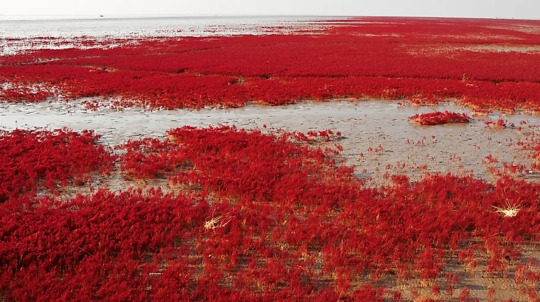
Panjin Red Beach marsh landscape_World Atlas
At Putney, as I afterwards saw, the bridge was almost lost in a tangle of this weed, and at Richmond, too, the Thames water poured in a broad and shallow stream across the meadows of Hampton and Twickenham. As the water spread the weed followed them, until the ruined villas of the Thames valley were for a time lost in this red swamp, whose margin I explored, and much of the desolation the Martians had caused was concealed.”
The War of the Worlds: The Work of Fifteen Days
________
“About one o’clock in the afternoon the thinning remnant of a cloud of the black vapour appeared between the arches of Blackfriars Bridge. At that the Pool became a scene of mad confusion, fighting, and collision, and for some time a multitude of boats and barges jammed in the northern arch of the Tower Bridge, and the sailors and lightermen had to fight savagely against the people who swarmed upon them from the riverfront. People were actually clambering down the piers of the bridge from above.
When, an hour later, a Martian appeared beyond the Clock Tower and waded down the river, nothing but wreckage floated above Limehouse.”
The War of the Worlds: The Thunder Child
______

A Martian fighting-machine battling with HMS Thunder Child. (Corréa, 1906)
“About a couple of miles out lay an ironclad, very low in the water, almost, to my brother’s perception, like a water-logged ship. This was the ram Thunder Child. It was the only warship in sight, but far away to the right over the smooth surface of the sea—for that day there was a dead calm—lay a serpent of black smoke to mark the next ironclads of the Channel Fleet, which hovered in an extended line, steam up and “ready for action, across the Thames estuary during the course of the Martian conquest, vigilant and yet powerless to prevent it.”
The War of the Worlds: The Exodus from London
Consider now this conversation between Jon and Melisandre.
"We've had a raven from Ser Denys Mallister at the Shadow Tower," Jon Snow told her. "His men have seen fires in the mountains on the far side of the Gorge. Wildlings massing, Ser Denys believes. He thinks they are going to try to force the Bridge of Skulls again."
"Some may." Could the skulls in her vision have signified this bridge? Somehow Melisandre did not think so. "If it comes, that attack will be no more than a diversion. I saw towers by the sea, submerged beneath a black and bloody tide. That is where the heaviest blow will fall."
A Dance with Dragons - Melisandre I
In the excerpt from TWOTW, we see that the bloody tide of the Martian red weed literally causes the Thames to flood London, which at the time was the premier English city of learning. London with its famous Tower Bridge and its two towers. We also see that the black smoke and fires from the Martian Heat Ray are destroying the British Fleet.
Juxtaposed those passages with Melisandre vision from ASOIAF. Mels has a vision of a symbolic bloody tide submerging towers by the sea. Her bloody tide echoes that of the red weed and black smoke flooding London and its countryside.
In ASOIAF, all evidence suggests that George’s version of the bloody tide will be caused by Euron as he and the Ironfleet attack Oldtown, the premier city of learning in Westeros and home to two major towers…the Hightower and the Citadel. Poor Quentyn famously broke down this theory in his Eldritch Apocalypse essay.
The rivers will be red with blood after the Ironborn attack, and any of the Redwyne fleet that were not previously destroyed, and or others put into play by Tyrells or Hightowers will be as defenseless against the Ironfleet as the British Navy is shown to be against the Martians.
There is also the potential for a real flood if shards of meteors hit planetos as has been proposed by Lucifer Means Lightbringer. This echoes the flooding caused by the Martians because as I discussed in part one, the Martian cylinders were at first thought to be meteors.
The bloody tide is not the only comparison George makes in his story to Euron and the events in The War of the Worlds.
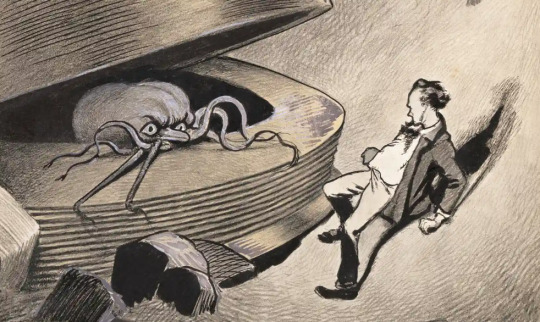
Illustration from original edition of HG Wells’s War of the Worlds, Public Domain
“Once a leash of thin black whips, like the arms of an octopus, flashed across the sunset and was immediately withdrawn, and afterwards a thin rod rose up, joint by joint, bearing at its apex a circular disk that spun with a wobbling motion. What could be going on there?”
The War of the Worlds: The Heat Ray
_______
“I talked with these soldiers for a time; I told them of my sight of the Martians on the previous evening. None of them had seen the Martians, and they had but the vaguest ideas of them, so that they plied me with questions.
“ ’Ain’t they got any necks, then?” said a third, abruptly—a little, contemplative, dark man, smoking a pipe.”
“I repeated my description.
“Octopuses,” said he, “that’s what I calls ’em. Talk about fishers of men—fighters of fish it is this time!”
The War of the Worlds: The Fighting Begins
Although this next excerpt has not yet officially appeared on the page, we learn about from George’s reading of an excerpt of The Winds of Winter at a convention, which fans such as Poor Quentyn and others recorded, transcribed, and shared with the rest of the fandom. Thanks guys!
The dreams were even worse the second time.
He saw the longships of the Ironborn adrift and burning on a boiling blood-red sea. He saw his brother on the Iron Throne again, but Euron was no longer human. He seemed more squid than man, a monster fathered by a kraken of the deep, his face a mass of writhing tentacles. Beside him stood a shadow in woman’s form, long and tall and terrible, her hands alive with pale white fire. Dwarves capered for their amusement, male and female, naked and misshapen, locked in carnal embrace, biting and tearing at each other as Euron and his mate laughed and laughed and laughed...
The Martians are compared to octopuses while Aeron views Euron as looking like a squid. Pretty much the same thing.
And what about the woman whose hands are alive with pale white fire. There has been much discussion in the fandom over who the woman might be with suggestions ranging from Dany to Cersei, to even Viserion as the dragon’s fire is pale white. As it is said that dragons can be both sexes, this theory assumes that Viserion is currently female.
Like dragons, the Martian’s have no discernable sex. However, unlike dragons who lay eggs, their procreation method seems to mimic that of flowers.
In the next place, wonderful as it seems in a sexual world, the Martians were absolutely without sex, and therefore without any of the tumultuous emotions that arise from that difference among men. A young Martian, there can now be no dispute, was really born upon earth during the war, and it was found attached to its parent, partially budded off, just as young lilybulbs bud off, or like the young animals in the fresh-water polyp.
The War of the Worlds: What We Saw from the Ruined House
I for one think the woman with hands with pale white flame is meant to represent Dany. While there is no female Martian, as I’ve discussed, the Targs and their dragons are heavily compared to the alien invaders and their fiery black smoke. And like the Martians, they bring fire and blood. Funnily enough, while there is no figure of a woman involved, there is a scene in TWOTW makes one think of the Euron excerpt. We get a hint that the woman with Euron is Dany in another of Melisandre’s memory of her vision.
“Visions danced before her, gold and scarlet, flickering, forming and melting and dissolving into one another, shapes strange and terrifying and seductive. She saw the eyeless faces again, staring out at her from sockets weeping blood. Then the towers by the sea, crumbling as the dark tide came sweeping over them, rising from the depths. Shadows in the shape of skulls, skulls that turned to mist, bodies locked together in lust, writhing and rolling and clawing. Through curtains of fire great winged shadows wheeled against a hard blue sky.”
A Dance with Dragons, Melisandre I
I’m not sure about the symbolic implication of the white fire in either instance, but the one with Euron does show George being consistent in echoing events in TWOTW. Let’s look at the passage in question.
The air was full of sound, a deafening and confusing conflict of noises—the clangorous din of the Martians, the crash of falling houses, the thud of trees, fences, sheds flashing into flame, and the crackling and roaring of fire. Dense black smoke was leaping up to mingle with the steam from the river, and as the Heat-Ray went to and fro over Weybridge its impact was marked by flashes of incandescent white, that gave place at once to a smoky dance of lurid flames. The nearer houses still stood intact, awaiting their fate, shadowy, faint, and pallid in the steam, with the fire behind them going to and fro.
The War of the Worlds
Dany represents the incandescent white fire, or in George’s parlay, the woman with hands of pale white fire.
Also, as I briefly discussed here, George has associated both Dany and Euron with storms for a reason. It gives them something in common and we the readers should wonder about this commonality. We should also ponder what might happen if these two storms merge and possibly generate a Fujiwhara Effect.
So, we come to the end of this series, that’s been 4 years in the writing. What are your thoughts? What do you think George writing Dany, the Targs and Euron like Martian Invaders will mean? Finally, what do you think of my red door theory…tinfoil? All thoughts welcome.
And yes, I will finish the Florian and Jonquil, and Dragon vs the Wolf series. I promise.
If you didn’t take my advice and read this chapter before reading the first two, you can go back and read them at the links below.
The War of the Worlds is a pretty short book…about 300 pages, and so if you want to read it for yourself to see other comparisons I didn’t include…and there are more, prices for the Apple e-book starts as low as $2.99. Or if you prefer a listen, check out the dulcet sounds of Robert from In Deep Geek as he reads the entire book on his second YouTube channel, The Well Told Tale.
PART ONE
PART TWO
GRRM’s ESSAY ON MARS
No doubt I will re-read and find numerous typos that I will have to go back to fix but here it is. Thanks for reading.
ETA 1/26/23...As expected, I found a few typos, which I fixed. I also added some sections header and a second quote from Melisandre’s visions pertaining to Dany and Euron.
#asoiaf#asoiaf meta#literary comparasion#war of the worlds#george rr martin#hg wells#daenerys targaryen#euron greyjoy#storm cloud meta#daenerys endgame#daenerys endgame analysis#asoiaf analysis#long meta#scr meta
20 notes
·
View notes
Text
what i read in 2023
hello! here's what i read over the last year, including some stuff i read/re-read for uni. all in all, it was a great year for reading, despite having a newborn who didn't sleep much lol. i haven't been able to write detailed reviews because i never take notes (oops) but here are my thoughts on what i read. hope you enjoy :-)
the prophet, kahlil gibran - 4 ⭐️ i originally rated this a 3.5 but have revised that rating... reading anything deep when sleep-deprived with a newborn is not a good idea, although i believe this was a lovely novel, i can't remember it all that well and will have to read it again to write a fair review.
lady chatterley's lover, d.h. lawrence (audiobook) - 4 ⭐️ i think i would prefer to just read this myself, rather than listen to it as an audiobook. i'm not really one for "spicy" books but this is very tame going by today's standards, and the story was gripping. when you consider the historical significance it makes it all the more interesting too in my opinion.
the professor, charlotte brontë - 3.5 ⭐️ i usually love anything brontë but was a little bored reading this. i didn't really like the protagonist and just found the plot a bit dull. not a bad novel by any means, but not my cup of tea.
watership down, richard adams (audiobook) - 5 ⭐️ beautiful!! just beautiful. i watched the film as a kid and was slightly traumatised, but the book runs rings around it. it's something that can be enjoyed by all ages and balances fantasy with reality. as a bunny servant, i really appreciated the level of detail the author went to to ensure he wrote rabbits correctly too!
the turn of the screw, henry james (audiobook) - 3.5 ⭐️ didn't hugely like this. i'm not a massive horror fan because i'm sensitive lol, but i find classics like this aren't too much for me. if anything i almost wished it were a bit more intense at times, it felt more sad than anything.
the time machine, h.g. wells - 4.5 ⭐️ really interesting story with a thought-provoking ending. i read it over the course of a day and it stuck with me ever since. it's also become inextricably linked with joanna newsom's album divers for me, with its themes of time travel, war and walking through ruins. would definitely recommend!
the fellowship of the ring, j.r.r. tolkien (audiobook) - 5 ⭐️ a completely and utterly beautiful book. i could probably write a whole book myself on how much i adore the lord of the rings, but now isn't the time or place. i was hooked instantly and as someone who grew up with peter jackson's trilogy, it was lovely to get to know the hobbits more at the start and explore the world more fully.
the cats of ulthar, h.p. lovecraft - 4 ⭐️ sinister and gripping short story. it takes something like ten minutes to read so i'd recommend it to anyone to be honest, especially if fantasy or horror are your cup of tea. i haven't read anything else by lovecraft to compare it to, but as a fan of lots of games that borrow from his lore i think the story probably fits into his world nicely.
the two towers, j.r.r. tolkien (audiobook) - 5 ⭐️ the opening to the second novel in the series was just heartbreaking, but still, i was glad to be back in middle earth. again, the level of detail in the books compared to the films is just astounding, and i found myself going back to relisten just to take it in fully.
a room with a view, e.m. forster - 4 ⭐️ i started this years ago and ended up putting it down. i'm glad i came back to it, though i still found it hard to get into actually. it was definitely a slow burn for me, but i do really enjoy books about the lives of regular people.
the return of the king, j.r.r. tolkien (audiobook) - 5 ⭐️ cried a little bit when i finished this. i truly love lord of the rings and this first listen to the audiobooks will hopefully stay with me forever. this year i hope to read the physical books and dive into middle earth all over again.
icons of the iron age: the celts in history and archaeology, susan a. johnston (audiobook) - 4.5 ⭐️ only because i listened to this through audible and sometimes found the presentation a little hard to follow. very informative and a great intro to the subject of the celtic peoples.
the silmarillion, j.r.r. tolkien (audiobook) - 5 ⭐️ definitely one to reread later on down the line, with a notebook so i can take notes, it’s so detailed and dense that it’s hard to remember recurring plot points and characters at times. but a beautiful book depicting a mythology.
the lifted veil, george eliot (audiobook) - 3.5 ⭐️ an interesting but, for me, unmemorable novel. i think i'll come back and read it again before i write anything significant about it however.
the last of the wild days, volume one: the howling hunt is nearing..., daniel j. loney - 3.5 ⭐️ a lot of potential, with engaging characters and intriguing lore and story, but lots of technical errors and issues with pacing and wordiness. looking forward to more instalments, but the book is definitely in need of an editor.
ogwen blues, george veck - 4.5 ⭐️ very dark, very gritty. left me feeling quite depressed afterwards to be honest, though the novel was an excellent and immersive read. not something i'd usually pick up but i'm glad i did.
cranford, elizabeth gaskell - 5 ⭐️ a really lovely little book. very quaint, exactly the kind of thing i love, just the goings on of regular people. i really enjoyed it, especially as 'brain bleach' after ogwen blues.
tender is the flesh, augustina bazterrica - 3 ⭐️ a quick and intense read but not a book i can say i’d recommend… very well-written but the content is highly unpleasant and not for the faint-of-heart. an interesting and horrifying commentary on the meat industry and, i suppose, how far humanity will go to keep up appearances of civility.
sir gawain and the green knight, pearl, and sir orfeo, j.r.r. tolkien - 5⭐️ really beautiful translation, with especial care taken to retain the alliteration of the original poems.
sir gawain and the green knight, brian stone - 4.5 ⭐️ loved it, but skipped through much of the original text section as i can’t read medieval english (maybe someday).
2 notes
·
View notes
Note
what kind of science fiction does emo beatrice/1930s au beatrice tend to write? is it “oh no! aliens!/oh no! creatures!” ala war war the of worlds and like, godzilla
dystopias like 1984 & episodes of black mirror, humans doing fucked up stuff that comes to bite them in the ass aka frankenstein and like every 1960s sci fi film about some giant creature that came about because of nuke bombs (which were pratically all the films then it seems), Weird Shit Happens ala the twilight zone, Exploring Them Oceans, Exploring Them Earth, or Exploring the depths of the earth ala journey to the center of the earth
Woag, space, ala more star trek esque stuff (spef tos), boom bam in space ala more star wars esque stuff? Normal people with normal problems but in sci fi settings! Among Us? (Side note that gave me the mental image of jonty in an among us costume thx to ava who convinced beatrice to let her dress him up via them puppy dog eyes and now i’m laughing my ass off.
semi related do you think beatrice would be the type to have a bunch of random & obscure dog merch? feel like she isn’t, that’s more ava’s thing, and ava’s thing is more on weird ass clothes for the dog that she deems cute, but i feel like beatrice probably has the occasional impulse buy or something that in hindsight was either stupid and/or the dog didn’t like collecting dust in her attic or something
((pls tell me beatrice has had the often universal pet owner experience of buying something more expensive than usual only for that money to just go to waste as the pet is near apathetic and likes something cheaper. i’m in hysterics imagining beatrice being Extra MopeyTM because she got some new relatively expensive dog food that was highly recommended by dog owners & vets w a bunch of Nutritional Benefits and she was excited to gift it to jonty, only for jonty to just sniff at the food, not touch a morsel of it and then whine that he didn’t get his usual birthday bone))
but i feel like beatrice might have like, a bunch of pictures of her dog and/or her & the dog, maybe even a whole album for them, and beatrice might have like a bunch of silly and/or matching pictures, like taking a picture in one of these type things, etc etc
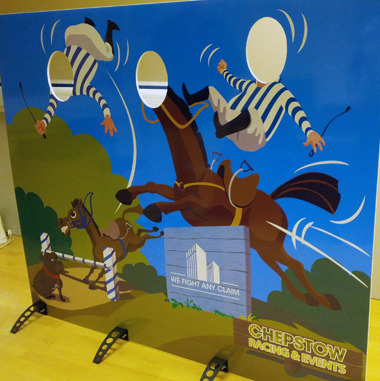
Great questions.
I think (unsurprisingly) Beatrice would be suuuuper influenced by H.G. Wells and definitely Shelley. The sci-fi she writes would be along the lines of what if the world was the same as it is now except for this one fucked up thing or like The protagonist meets this one character or thing that changes them and flips their world on its head.
Her novels were probably verging on social satire and were inspired heavily by the war. She retaliated against her upbringing through her books. her father was absolutely Oxbridge educated and had a lot of books/subscribed to literary journals so Beatrice had a lot of material as a kid.
(The more... ahem frowned upon books she had to source herself. she definitely read Flowers of Evil and Carmilla etc and was left feeling very 123?!!13XZSDVFGH4????!!!1f?? by them. Also definitely read The Well of Loneliness and hated it a little bit.)
Short stories like The Croquet Player and A Dream of Armageddon were a reference point for her early writing probably. (she definitely had a wild time reading the time machine, as did I) Themes around Duty vs Love etc are just very very Avatrice so A Dream of Armageddon felt very them. It was sort of like what if Avatrice chose to leave together instead of fight etc and rejected their responsibilities in favour of being together and unbothered and in love and ran away back to Switzerland (but in the story it's Capri) idk it just made me think of that a little bit.
I imagine one of her more popular novels would be something about the intersection between religion and Science and some sort of reconciliation and/or divide between the two. Like maybe a new theory/invention/revelation that seemingly disproves a major theological belief, a la Ted Chiang's 'Omphalos' except in 1930 lol. Idk I'm not about to write an entire novel inside of this fan fic. Or am I... probably not,,, but who knows??? (not me).
I don't think Bea would hem herself in too much though. So there'd totally be weirder more experimental books the older she got (and the more comfortable she got in being a bit weird). Overall she'd lean more towards speculative/dystopian fiction rather than full-blown Star Trek-type sci-fi. Like, imagine how fucked up we can be as opposed to how fucked up things from outer space can be.
In regards to the pet tangent:
Beatrice has a million comfy dog beds for Jonty but (a lot like my own dog) he sleeps on none of them, much preferring cardboard boxes, people's shoes, or the windowsill. The Cardinal (Beatrice's cat) appreciates the beds though.
Jonty is far too wriggly to be still enough to have his picture taken/be put in clothes. The Cardinal on the other hand is perpetually :| and chill with everything so Ava would probably convince Bea to spend money on buying a camera or paying for professional pictures of him like these:
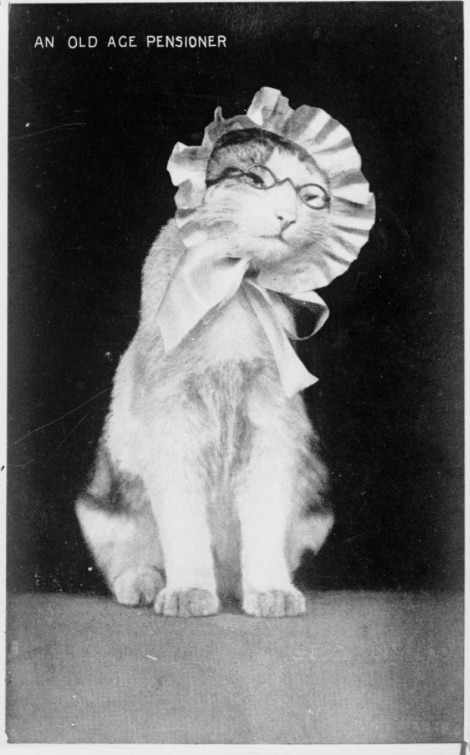
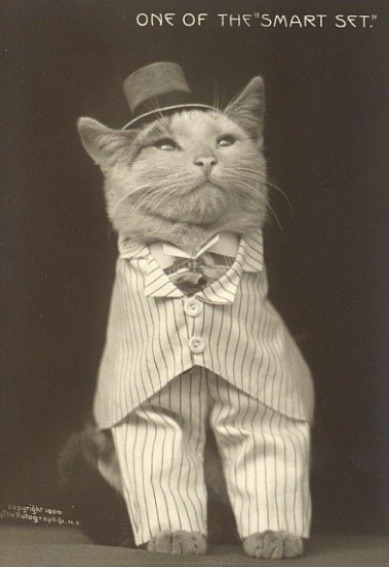
Beatrice would scoff but then, a few days later, would have them framed and put up.
This hc spiralled a bit but god was it fun. Thanks as always for the great question/thoughts.
#the cardinal will be introduced in the next chapter properly#next chapter should be up monday or tuesday depending on life#misiek asks#warrior nun#avatrice#1930s au#idk sometimes I have to emphasise that this is my hc and is probably and extremely cold take#I’m not great at these things#but questions like these help me flesh out the characters outside of the fic#and it helps !!!#cold or at least lukewarm takes
11 notes
·
View notes